Year 8 & 9 Options
Options overview
Through Years 7 and 8 students get the opportunity to study a wide range of subjects across all areas of the curriculum. We believe that it is important to allow students to start determining the subjects that they wish to study to GCSE examination standard at the end of Year 8. For this reason, the College operates an option process that operates in both Year 8 and Year 9.
The Core Curriculum
The College has considered the subjects all students need to study for their GCSEs. Although you cannot ‘choose’ these subjects, information about them has been included.
The core subjects are:
- English, Mathematics and Science
- Physical Education
- Personal, Social and Health Education (PSHE)
Year 8 options
Students will choose towards the end of Year 8 one subject that they wish to study as an ‘early entry’ GCSE. The students will study this subject intensively through Year 9 and 10 sitting a final exam in the summer of Year 10.
Alongside the early entry GCSE course, students will also choose to specialise in four further ‘regular’ option subjects in Year 9. To maintain a broad and balanced curriculum for our students at this stage we insist that each student in Year 9 studies at least one ‘Ebacc’ subject (History, Geography or Computer Science) and Modern Foreign Languages.
Year 9 options
Students will choose towards the end of Year 9 three subjects from their regular options that they will continue to study in Years 10 and 11, taking a final exam in the summer of Year 11.
Throughout the options process, students are encouraged to make informed decisions about the choices they are making. To support this, the College has an extensive careers education programme as well as systems that ensure that each student is fully counselled on the subjects they are taking (this includes a 1 to 1 personal interview with a senior member of staff in the College).
Subject Guides
These allow you to compare the subjects according to their demands – try to balance their requirements to your skills and abilities. Each subject has been rated by their teachers according to a range of factors:
- Literacy - The level of writing and reading required.
- Numeracy - the level of maths application involved.
- Communications - The need to explain and share your thoughts and ideas with others.
- Creativity - The need to think for yourself creatively.
- Practical - The level of "hands-on" involvement required.
- Group work - Working with others – being both dependant and dependable.
Options subject Guide overview video
If you have any questions regarding the course content below or about the Options process in general, please contact Mr Potts, Assistant Headteachers via chris.potts@crookhorn.hants.sch.uk or Donna Martin, our Careers Leaders via donna.martin@crookhorn.hants.sch.uk
Please find below Options Subject Guides for each individual subject, available to view digitally. If you require a printed copy in the form of an A5 booklet, please email admin@crookhorn.hants.sch.uk
Art and Design
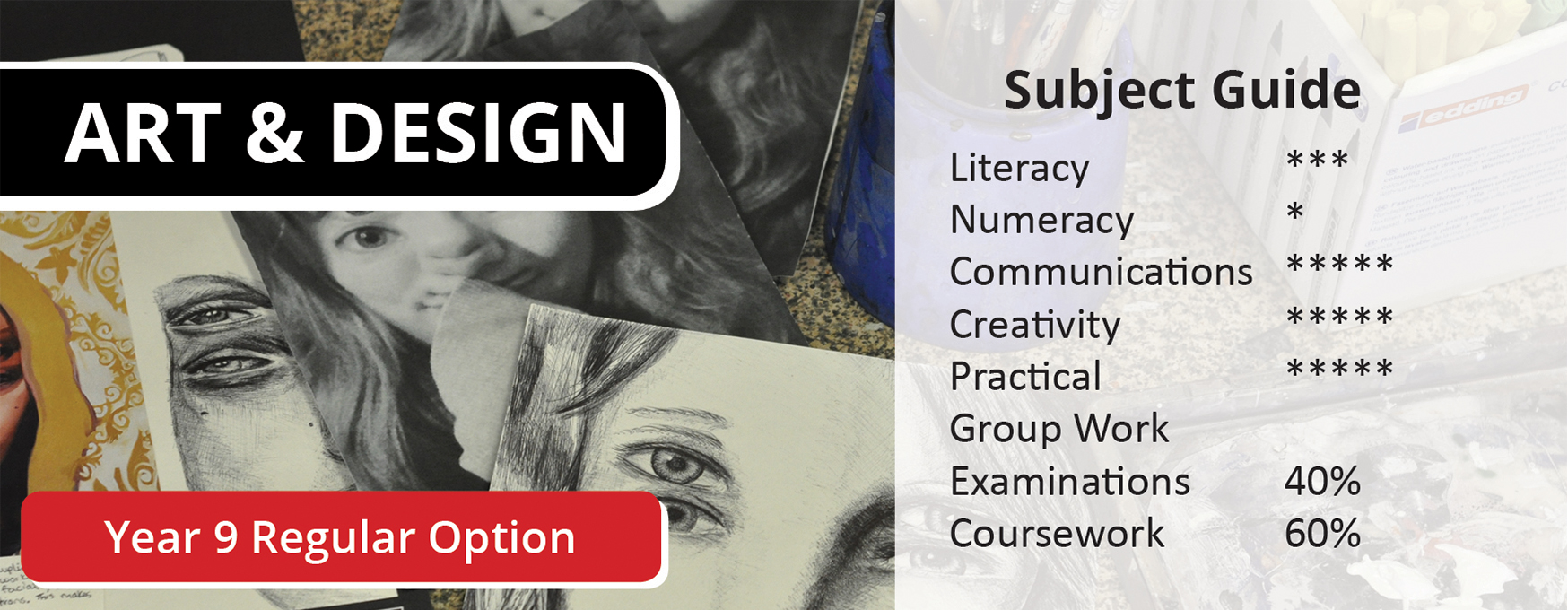
Summary of course
GCSE Art and Design gives students the opportunity to explore materials, techniques and develop skills. The course focuses on four assessment objectives. These consist of observational drawing; analysing artists’ work and that of different cultures; developing and exploring ideas; and finally a personal response. Students will complete four projects over the two years, which will make up a portfolio of coursework (60%).
Finally, students will be issued their exam paper at the end of January. Students start exam preparation and will complete their final exam in May. This is a 10-hour exam completed over 2 days, where students complete a ‘Final piece’ in response to all their preparation work completed previously (40%). All work is assessed through the 4 objectives mentioned earlier. It is marked by the teacher and then moderated with an AQA examiner.
What it can lead to at College and beyond
GCSE Art and Design can be a stepping stone towards A Level Art, Textiles or a BTEC National Diploma in similar Art-related subjects. This could then lead to degree courses (BA/ BA Hons) in various subject areas.
Art is so diverse that future careers can be very varied and could lead to professional artist, Art teacher, illustrator, graphic designer, interior designer, printmaker, fashion designer, theatre design, ceramics and many more.
Extra-curricular commitment requirements
As with any Art-based subject, Art is very time-consuming, so you must be committed to finishing your work in your own time. We recommend that you attend subject study club regularly and complete homework which will include photography, practical work and written work; all of which will count towards your coursework portfolio. This will mean that you should also be prepared to have your own supplies for practical work that you keep at home, and access to a printer.
For more information on the course, please contact Mrs Pitassi.
Art photography
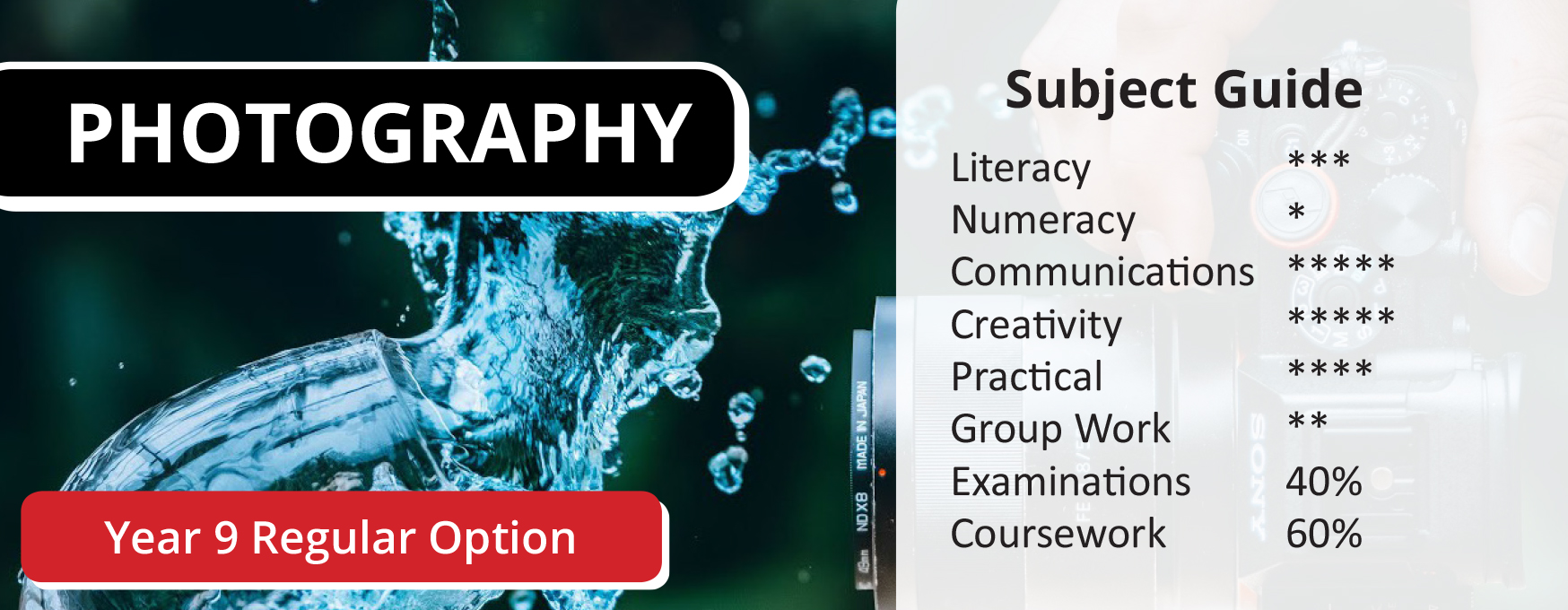
Summary of course
This is a creative and practical course for those with a passion for photography and are keen to develop their skills. In this course, you’ll get to experiment with cameras and learn techniques to create exhibition-standard pieces. Starting in Year 9, you’ll explore topics like lighting, angles, and photo editing in Photoshop. This will give you a strong foundation in the subject.
During Years 10 and 11, you’ll work on creative projects such as Nature vs. Man-made and Portraiture. In these projects, you’ll study the work of famous photographers and artists to gain ideas and inspiration for your own work. You will also create unique responses to the project themes.
Sixty percent of your grade will come from coursework based on the projects, while the other 40% comes from an externally set project that is completed with a 10-hour practical exam. By completing this course, you will earn a GCSE in Art and Design (Photography).
What it can lead to at College and beyond
A GCSE in Photography can be a valuable foundation for various creative careers, especially those that benefit from strong visual skills, an understanding of composition, and experience with digital tools. All local colleges offer A-level or Level 3 courses in Photography. Here are some potential career paths a Photography GCSE can help you pursue:
- Professional Photographer
- Photojournalist
- Graphic Designer
- Visual Artist
- Videographer or Cinematographer
- Marketing and Advertising
- Film and TV Production
- Forensic Photographer
And many more...
Extra-curricular commitment requirements
As with any art-based subject, Photography is very time-consuming and coursework is extensive and requires at least 2 hours of work outside of class each week. You will need to take photographs for your coursework portfolio outside of school, either using school cameras or your camera phone. You’ll also need to access your digital work through OneDrive, either from home or at Study Club. Additionally, there is a Student Photographer Initiative where you may be invited to photograph college events, such as open days, house events, assemblies, and awards evenings.
For more information on the course, please contact Mr Potts
Art textiles

Summary of course
As this course is on the art specification, it requires similar skills to Art and Design. Students will require a good base knowledge in painting and drawing as well as an enthusiasm for trying new things. On this course we explore the potential for fabric and embroidery to be used as tools to create art, illustration and sculpture.
The course is structured around four assessment objectives which look at your ability to: research and replicate the work of various artists; experiment with materials and processes and develop ideas; record your process through photography, drawing and written annotation; and to produce a personal final piece as the outcome of the project. Students will complete 3 projects during the course which will make up a portfolio of coursework (60% of overall grade).
Finally, as with Art, students will be issued with an exam paper in January of Year 11. This paper will provide project themes for the student to choose from, and complete independently before their final exam in May. This is a 10-hour exam completed over 2 days, where students will create a final piece for their chosen project, using the preparation work that they have produced (40% of overall grade). All work is then assessed by the teacher and moderated by an AQA examiner.
What it can lead to at College and beyond
GCSE Textile Arts can lead to further study at A level, either as an Art based subject or Technology Textile Design, UAL Diploma in Art or Fashion design. This could then lead to degree courses (BA/Hons) in a variety of creative subjects.
Possible future careers are Visual Artist, Art Teacher, Textiles, Fashion, Set and Costume Design, Interior Design, Buyer, Visual Merchandising, Surface Design and more.
Extra-curricular commitment requirements
As with any Art-based subject, Textile Arts is very time-consuming, so you must be committed to finishing your work in your own time. We recommend that you attend subject study club regularly and complete homework which will include photography, practical work and written work; all of which will count towards your coursework portfolio. This will mean that you should also be prepared to have your own supplies for practical work that you keep at home, and access to a printer
For more information on the course, please contact Mrs Pitassi.
business Studies
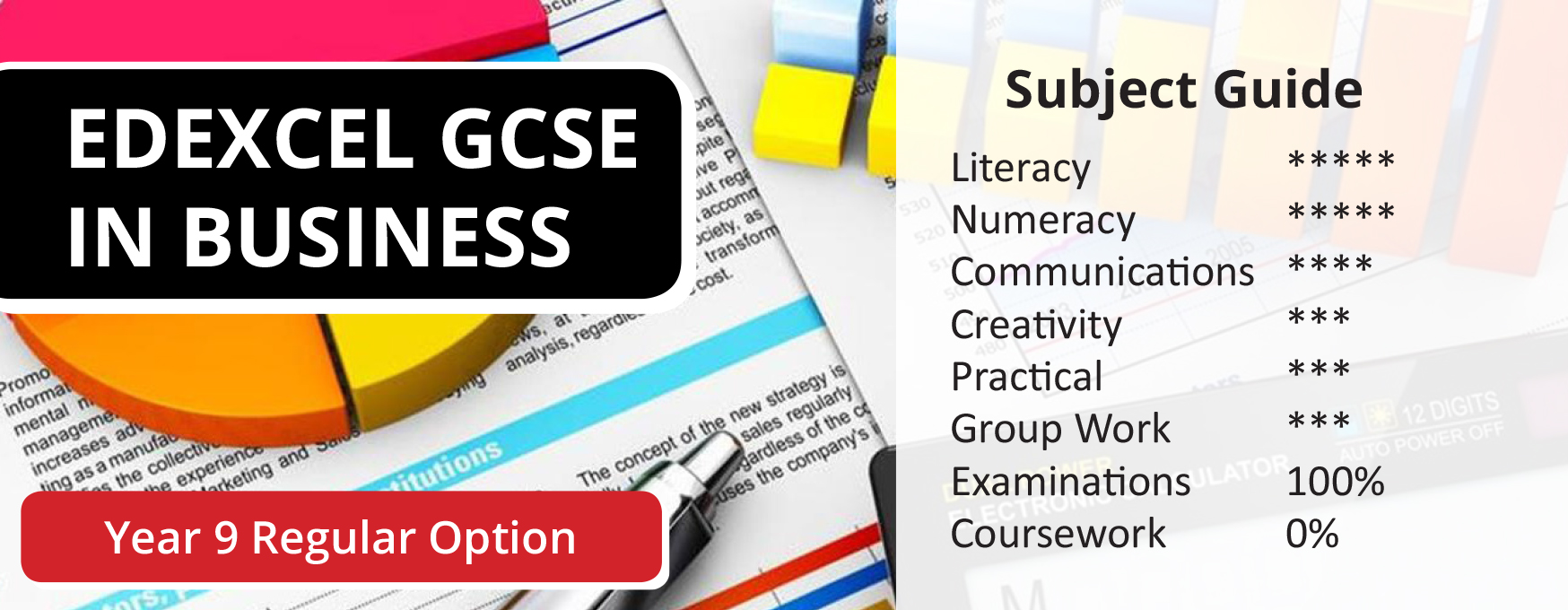
The Edexcel GCSE in Business is comprised of 2 externally assessed exams:
Theme 1 – Investigating small business
- Enterprise and entrepreneurship.
- Spotting a business opportunity.
- Putting a business idea into practice.
- Making the business effective.
- Understanding external influences on business.
- Written examination: 1 hour and 45 minutes.
- Calculations, multiple-choice, short-answer and extended-writing questions.
Theme 2 – Building a business
- Growing the business
- Making marketing decisions
- Making operational decisions
- Making financial decisions
- Making human resource decisions
- Written examination: 1 hour and 45 minutes.
- Calculations, multiple-choice, short-answer and extended-writing questions.
What it can lead to at College and beyond?
A level 2 qualification in Business is useful if you want to study Business Studies, Accounts or Economics A Level or Business BTEC at Level 3.
Business Studies GCSE can be useful for absolutely every job. Business Studies is particularly relevant if you want to work in the Human Resources, Marketing and Finance department of either a small or large business. It is also relevant if you want to work as an accountant, stockbroker, recruitment consultant or be an entrepreneur and set up your own business.
For more information on the course, please contact Mrs Burnham.
Catering
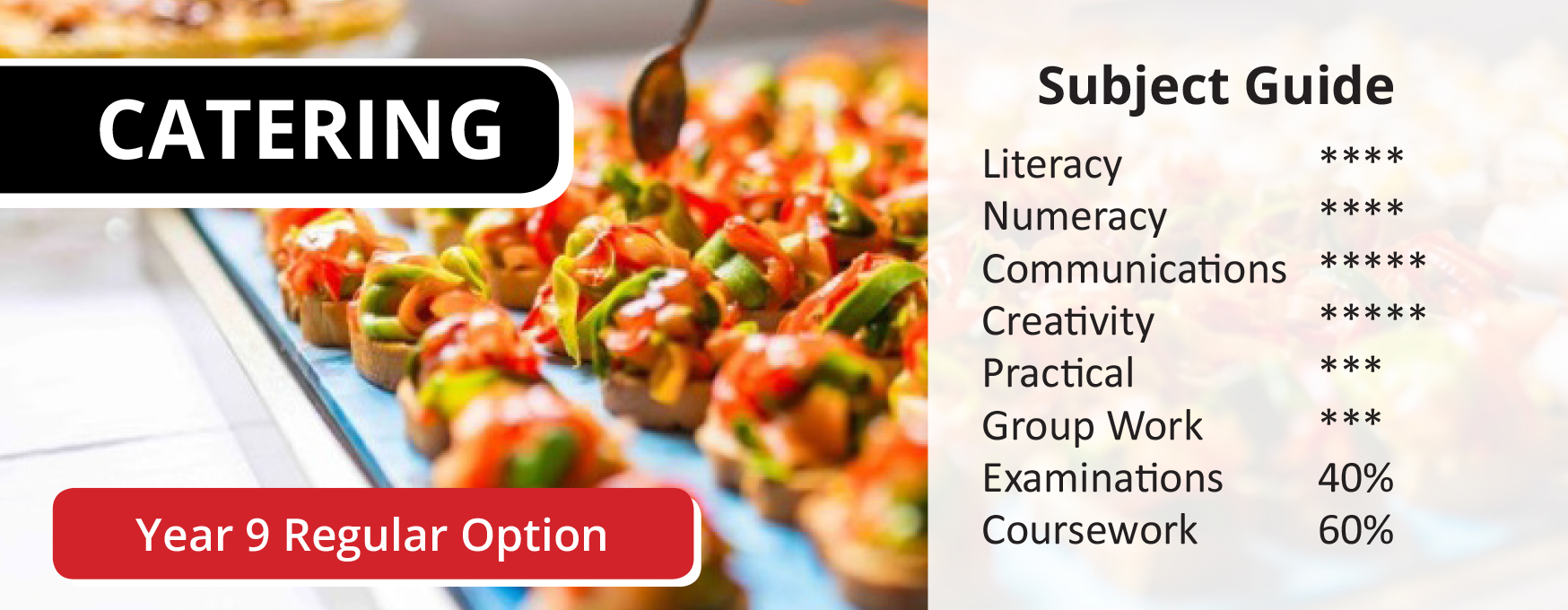
Summary of course
This course offers a unique opportunity for students to develop their knowledge and extend their skills within catering in a vocational context. The specification encourages the investigation and study of catering in a variety of contexts and uses a range of assessment techniques to enable students to respond through practical and investigative work. If you enjoy cooking and developing a range of skills that will develop your understanding of different foodstuffs and how to use the equipment correctly and safely, then catering is an ideal option.
Areas of study include: the industry – food and drink, job roles, employment opportunities and relevant training: health, safety and hygiene; food preparation, cooking and presentation; nutrition and menu planning; costing and portion control; specialist equipment; communication and record keeping; and environmental considerations.
What it can lead to at College and beyond
It is a suitable qualification for those who want a broad background in this area and for those who wish to progress to further education, for example to complete a City & Guilds catering qualification. It will also offer valuable preparation for those entering the world of work. Possible future careers in this subject: catering; hospitality; tourism; nutritionist; dietitian; health & fitness work; and medical.
Extra-curricular commitment requirements
There will be an element of cost related to the purchasing of chef’s whites, ingredients etc. and you will be responsible for providing these items each practical session (including your washed and clean whites).
For more information on the course, please contact Miss Westmoreland
Computer Science
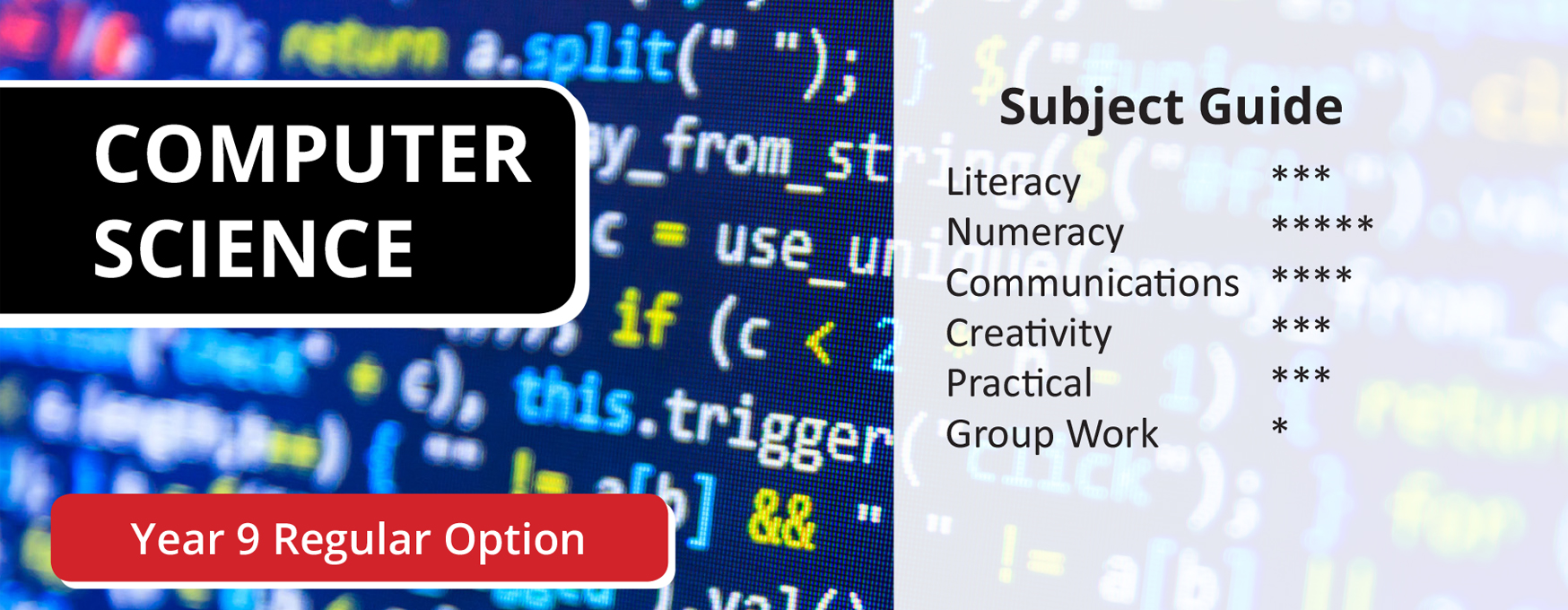
Summary of course
Computer Science offers students the opportunity to gain an understanding of the way computers work, and to create and review computer programs for real-life purposes. It encourages students to create games, applications and other systems, rather than simply use those designed by others. A high level of mathematics is required for this course. It is a linear specification and all assessments are taken at the end of the course.
During the course, in addition to the coding you will also cover:
Algorithms and code design - This will cover flowcharts and pseudocode.
Computer Systems - Included will be binary and computer architecture. This includes storage and compression techniques used in sound and images/video.
Computer Architecture - You will learn about the in-depth operation of the processor.
Networks - The benefits and dangers of networks will be discussed in this unit.
Databases - In this short unit, you will look at the use of databases.
Computers in society - You will study the use and misuse of computers and the legal (and moral) issues that this entails.
Data Representation - How data is stored in a computer. This will cover the most mathematical sections of the course as binary is introduced.
Cyber Security - Students look at all aspects of cyber crime and, more importantly, the steps that can be taken to avoid this.
Assessment is entirely done by examination covering the various parts of the course.
For more information on the course, please contact Mrs Burnham
Construction
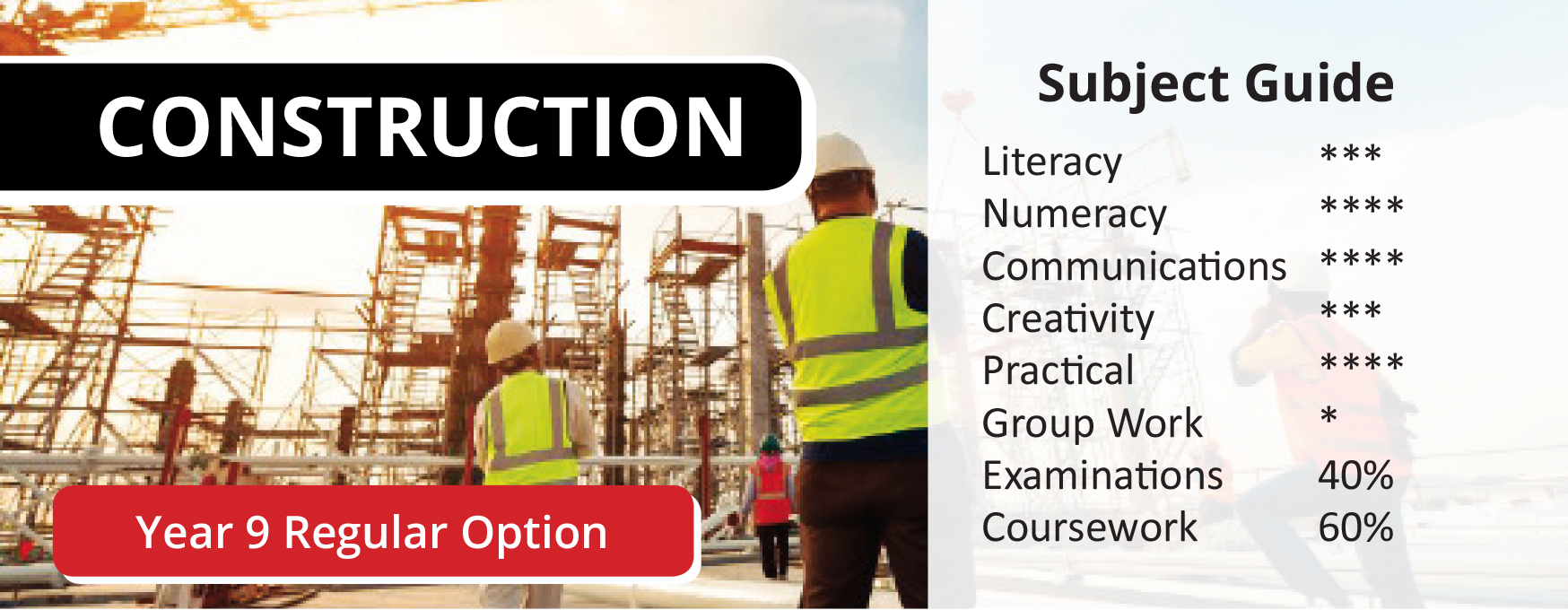
Summary of course
The Level 1 / 2 Awards in Construction and Built Environment allow students to understand what core skills are required for the construction industry.
You will develop a range of skills both practical and academic, through applied learning that will be useful in the workplace and for future learning.
The course provides a foundation of knowledge about the construction industry that will help learners progress to further study or enter the workplace.
It motivates learners through purposeful tasks set in a construction industry context.
Subject areas covered during course
- Electrical systems
- Decorating
- Carpentry/Joinery
- Planning in construction
- Health and Safety in the workplace
How it’s assessed
Unit 1 - Introduction to the built Environment On-screen examination:
1 hour 30 minutes - 40% of qualification - 80 marks.
Unit 3 - Constructing the Built Environment Controlled assessment:
30 minutes - 60% of qualification - 120 marks.
What it can lead to at College and beyond?
Level 3 Construction at College or apprenticeship scheme after leaving Crookhorn College.
Extra-curricular commitment requirements
When completing the internally assessed sections of the course students will be required to use the technology facilities to keep up with the demands of the course.
For more information on the course, please contact Mr Trott
Creative iMedia
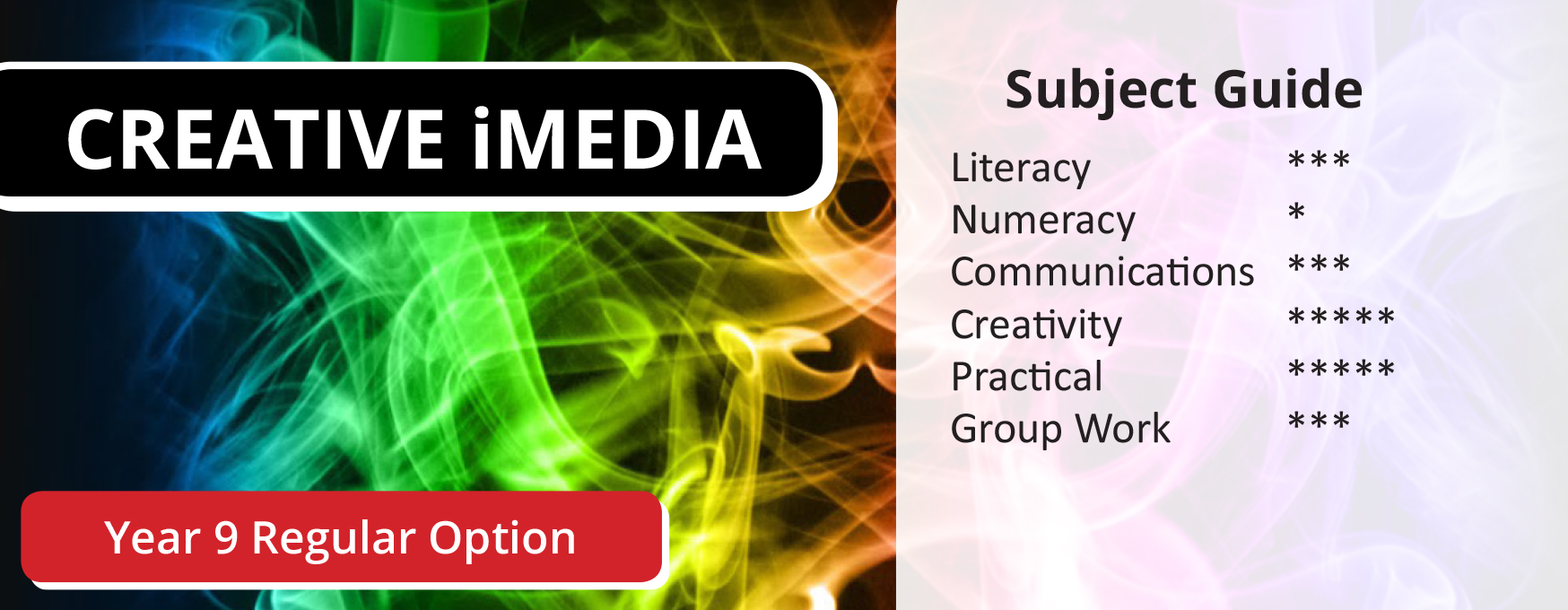
Summary of course
You will study the media industry with a focus on new media, such as the internet, digital advertising and graphics presentation. You will look at how companies use media campaigns to develop their growth. You will learn practical skills in Photoshop, website design and animation. The written aspect includes detailing how companies brand themselves and the production elements needed to create a campaign.
By the end of Year 9, students will have transferable skills in the various areas that will support other subjects, as well as continuing iMedia into Year 10.
The course has a written exam at the end of Year 11 and two coursework-based projects.
Topics for coursework:
- Visual identity & digital design
- Animation with audio
What it can lead to at College and beyond
This course builds skills in digital design and an understanding of the industry that can transfer to any graphics/design-based course at College. With digital media being an ever developing sector of work, having skills and an understanding of the process could be invaluable in any job role.
For more information on the course, please contact Mrs Burnham
dance
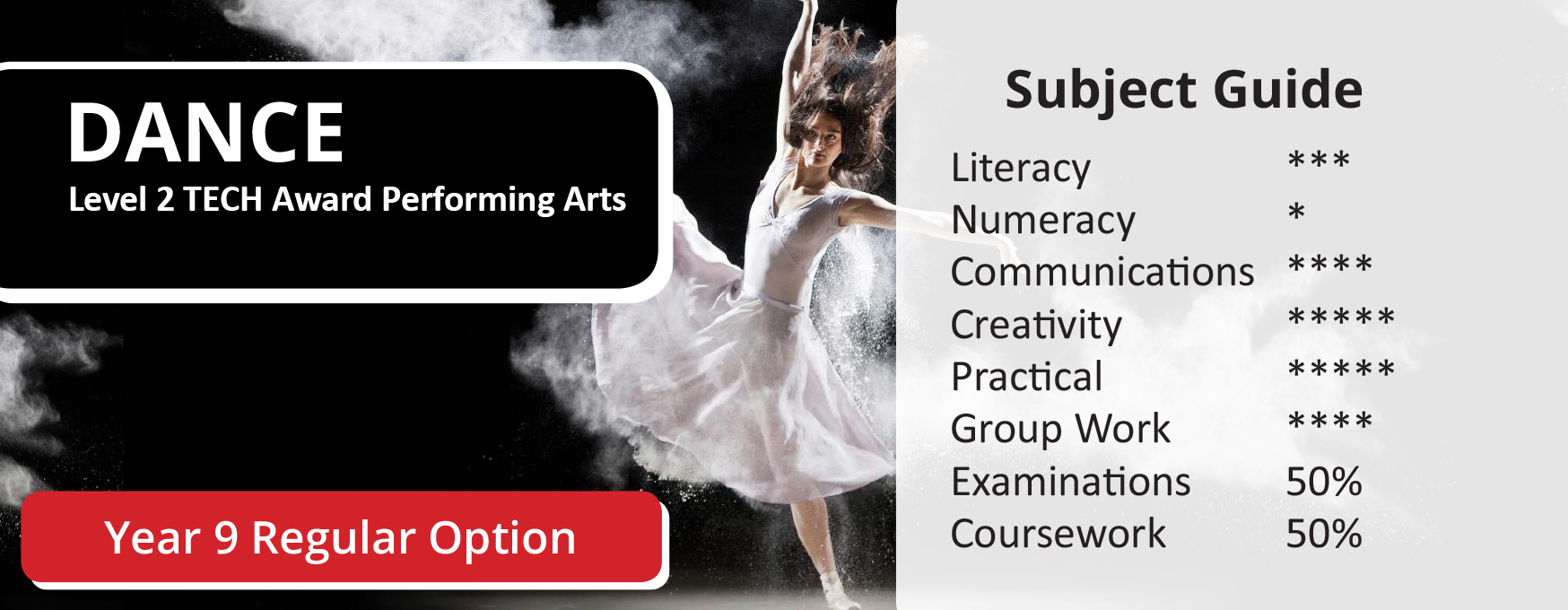
Why Study Dance?
Would you like to take a hands-on, practical course along-side your GCSEs that gives you a taste of what the Performing Arts sector is like, as well as giving you the skills and confidence to succeed in your next steps?
Why choose a BTEC Tech Award in Performing Arts?
This course enables learners to develop the foundational skills that are integral to a wide range of roles (from performing to designing and directing) across the creative industries.
Through this course, learners will acquire sector-specific applied knowledge and skills through vocational contexts by studying professionals’ work and processes used, the skills and techniques used in different roles, and how to contribute to the creation of a performance role, in a performance role. Learners will also have the opportunity to develop their own practical and interpretative skills through workshops and classes.
As a creative subject with a focus on application, there is no written exam.
With a Tech Award you will:
- Get a taste of what a sector is like.
- Gain transferable skills and confidence that will help you in the world today and prepare you for your futures.
- Be encouraged to commit to performing in a whole College production.
Content Overview
Component 1: Exploring the Performing Arts (30%)
Learners will develop their understanding of the performing arts by examining the work of performing arts professionals and the processes used to create performance.
Component 2: Developing Skills and Techniques in the Performing Arts (30%)
Learners will develop their performing arts skills and techniques through the reproduction of acting, dance and/or musical theatre repertoire as performers or designers.
Component 3: Responding to a Brief (40%)
Learners will be given the opportunity to work as part of a group to contribute to a workshop performance as either a performer or a designer in response to a brief and stimulus.
What it can lead to at College and beyond
The possibilities are endless. Performing Arts will enable you to demonstrate many skills which employers, colleges and universities will be looking for. It can also give you opportunities to travel, meet people and get the most out of life.
For more information on the course, please contact Mrs Callaghan
drama
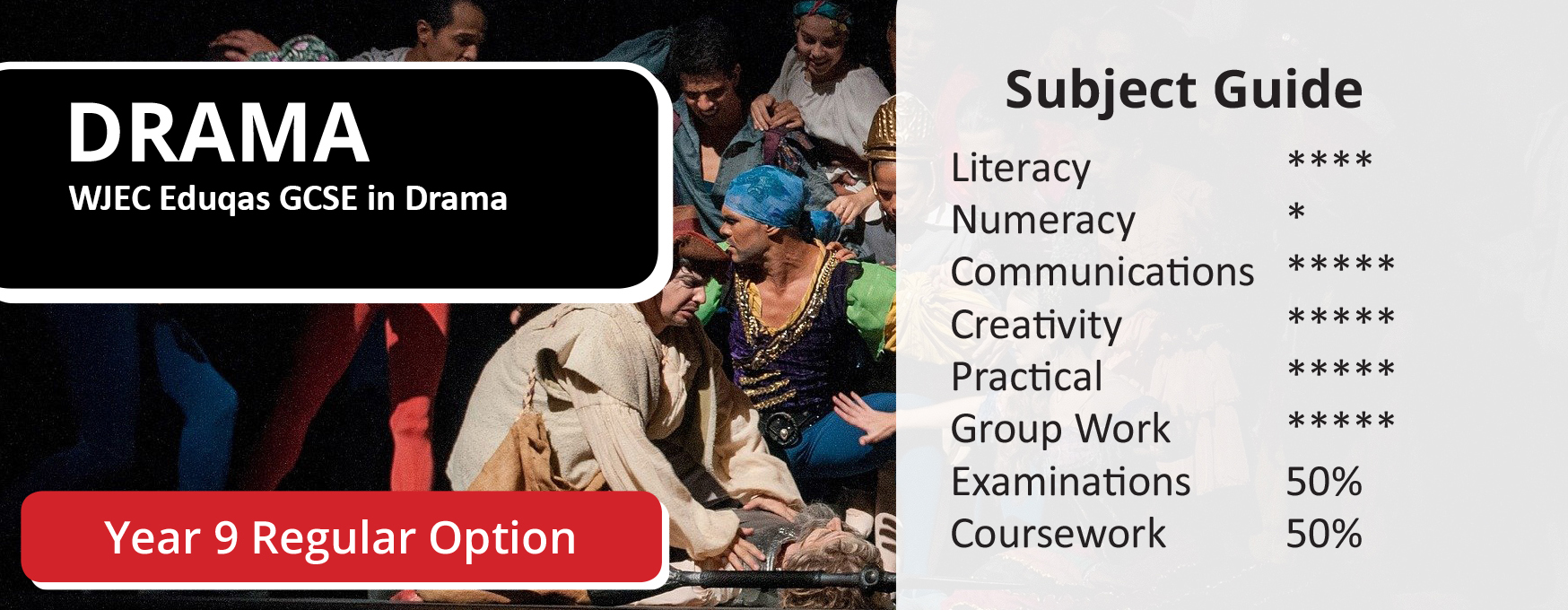
Why choose GCSE Drama?
- You’ll develop a wide range of skills.
- You’ll gain confidence and have fun.
- You’ll learn to work within a team and balance a range of ideas.
- You’ll have a mix of practical and written work unlike any other subject.
What skills will I develop?
You will have the opportunity learn and develop a range of transferable skills and practise applying these to new situations. These include analytical, problem-solving, organisation and time management skills. Your practical skills will be refined and will demonstrate creativity, reflection and resilience, as well as developing confidence and strong presentation skills. Your written skills, both analytical and creative, as well as your ability to self-reflect, will be developed through a range of tasks. Through studying drama, you will be equipped with the skills to succeed in your next steps.
What does GCSE drama involve?
The GCSE Drama specification is designed to give you a broad and balanced experience of Drama. You will collaborate in devising your own piece of theatre and perform in a performance from a text.
About the course:
Unit 1: Devising Theatre 40% (Teacher assessed, and externally moderated)
You will participate in the creation, development and performance of a piece of devised theatre. You will produce:
- A portfolio of supporting evidence based on the rehearsal process
- A performance lasting between 5-16 minutes (depending on the number of actors in your group)
- An evaluation of the final performance or design.
Unit 2: Performing Theatre 20% (Externally assessed by a visiting examiner)
You will study two extracts from the same text chosen by you or your teacher.
- A performance lasting between 5-14 minutes using sections of text from both extracts.
Unit 3: Interpreting Theatre 40% (Externally assessed examination)
Written examination: 1 hour 30 minutes - You will answer:
- Section A: Set Text - A series of questions based on the set text that you have studied.
- Section B: Live Theatre Review – One question from a choice of two, analysing and evaluating a given aspect of a live theatre production seen during the course.
- Students must see live theatre.
What it can lead to at College and beyond
The possibilities are endless. Drama will enable you to demonstrate many skills which employers, colleges and universities will be looking for. It can also give you opportunities to travel, meet people and get the most out of life.
For more information on the course, please contact Mrs Callaghan
Engineering
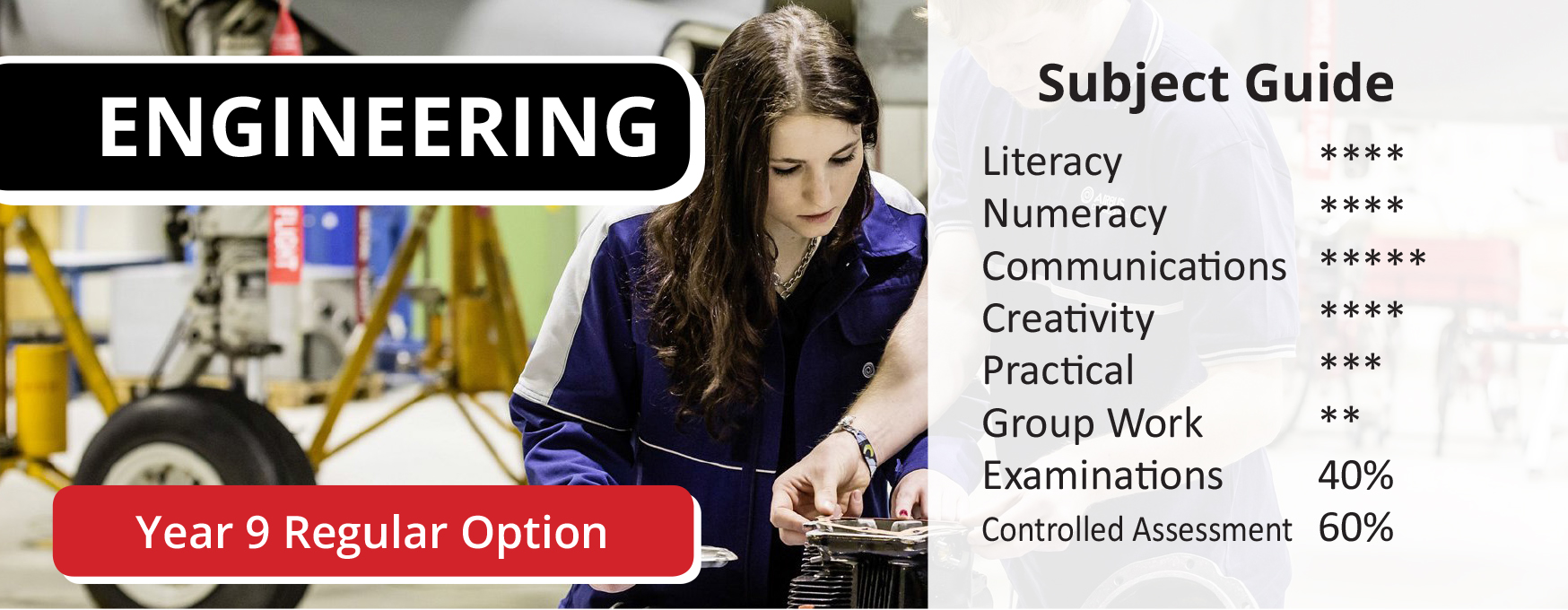
Summary of course
This course offers a range of engineering skills that are relevant to those considering an engineering course or apprenticeship post 16, or those looking to progress through ‘A’ levels in preparation for an engineering degree. Many skills will also support progression in Architecture. The course gives learners the opportunity to develop engineering knowledge and skills in a practical learning environment. The main focus is on four areas of equal importance, which cover the:
- development of key engineering practical and technical skills, such as research, observation, measurement, making, using computer-aided design (CAD) and disassembly.
- knowledge of key engineering sectors (mechanical, electrical/electronic and engineering design) and the interrelation of each in industry.
- knowledge of the stages involved in planning and implementing an engineering project.
- A series of practical and design projects.
Internal controlled assessment: Components 1 and 2 are assessed through internal assessment. This makes up 60% of the course.
External assessment: Unit 3 examination. This makes up 40% of the course.
Engineering is a career that includes report writing, designing (both hand drawn and computer aided), as well as analysing engineered products so a good literacy level is required. This is the most academic of the technology options; please speak to Mr Morgan if you are unsure if you are suited to the course.
What it can lead to at College and beyond
Upon completion, learners can progress to a wide range of Level 3 engineering qualifications, A level Engineering and A-level Design and Technology. There are also engineering apprenticeships available locally that mean you can earn and study together.
Extra-curricular commitment requirements
When completing the internally assessed sections of the course students will be required to use the technology facilities to keep up with the demands of the course.
For more information on the course, please contact Mr Morgan
English Language
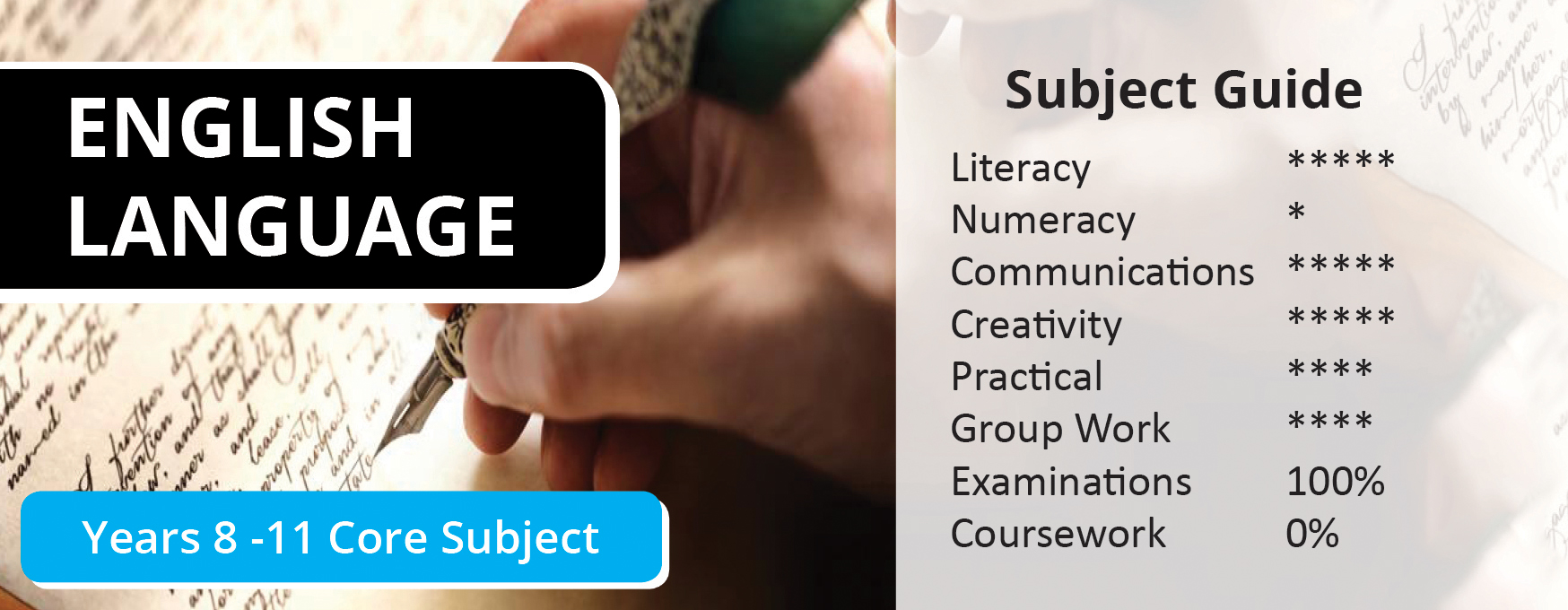
Summary of course (please note English Language is not an ‘optional’ subject)
You will study this course in parallel with English Literature.
For the Component 1 Exam, you will refine your skills as a reader of modern literary prose texts and develop your creative writing skills. For the Component 2 Exam, you will refine your skills as a reader of a range of non-fiction texts (from the nineteenth century onwards) and develop your non-fiction transactional writing skills.
Throughout the course you will develop and refine your skills as a speaker and a listener in a variety of situations- individually, in groups and in role. You will be able to analyse how language works in action.
By the end of the course you will achieve a GCSE in English Language… and you will be a confident, independent, critical thinker as well as a rounded, articulate and successful communicator!
What it can lead to at College and beyond
Success in English Language will, of course, lay the foundations for your work in English Language or Literature at AS level. But the listening, speaking, reading and writing skills you will develop will also be useful across a range of arts, humanities and social science subjects, and the evaluation skills you will develop will be useful in each and every subject, both at Sixth Form, College or in higher education.
In fact, the ability to use English successfully will open doors for life!
Extra-curricular commitment requirements
You will be expected to complete regular study skill, reading or writing homework. Study Club will be offered in order to help you take your work to the next grade.
For more information on the course, please contact Mr Bezant
English Literature
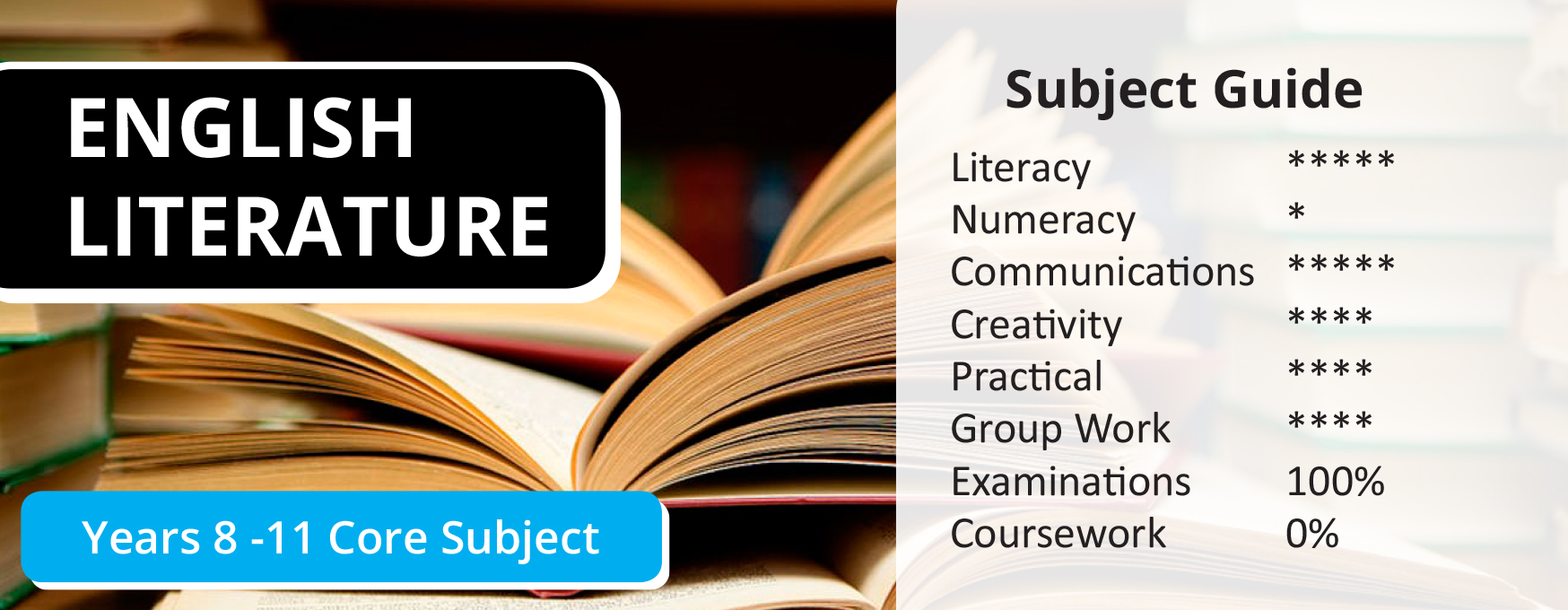
Summary of course (please note English Literature is not an ‘optional’ subject)
You will study this course in parallel with English Language.
You will develop and refine your skills as a critical, independent reader of the three forms of fiction, as you study and respond to a wide range of texts – novels, poetry and drama, including Shakespeare.
For the Component 1 Exam, you will study and respond to a play by Shakespeare and a range of classic and modern poetry. For the Component 2 Exam, you will read and respond to a modern novel or play, nineteenth-century prose and unseen poetry.
By the end of the course you will achieve a GCSE in English Literature… and you will be an independent, confident, rounded and articulate critical reader.
What it can lead to at College and beyond
Success in English Literature will, of course, lay the foundations for your work in English Literature or Language/Literature at AS level, and possibly for Drama too.
In addition, the critical reading and writing skills you will develop will also be useful across a range of arts, humanities and social science subjects, and the evaluation skills you will develop will be useful in each and every subject, both at Sixth Form, College or in higher education.
Extra-curricular commitment requirements
You will be expected to complete regular study skill, reading or writing homework. Study Club will be offered in order to help you take your work to the next grade.
For more information on the course, please contact Mr Bezant
Geography
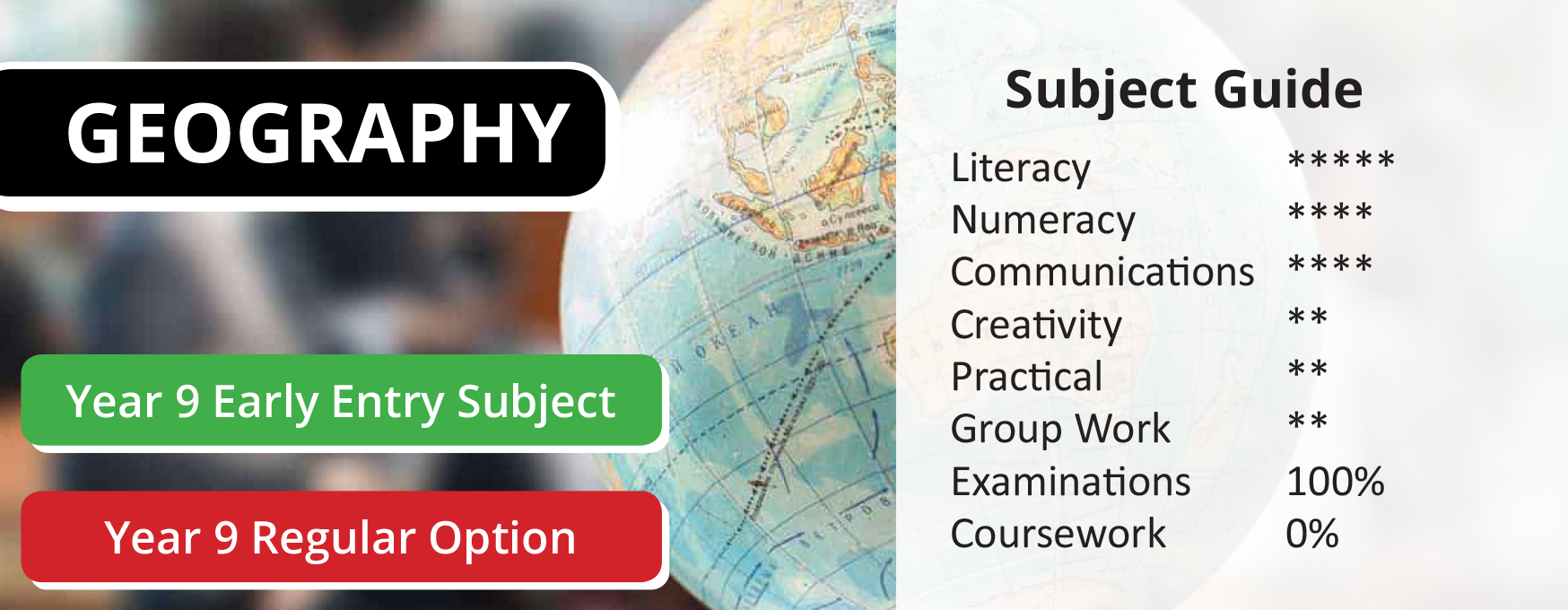
Summary of course
Geography helps make the world make sense. This GCSE offers you the opportunity to explore the planet from the comfort of your classroom! Throughout the course you will look into a variety of exciting places, events and actions which have shaped the world we live in – piecing together the physical, human and environmental features around us to understand the bigger picture of this incredible planet.
The course will appeal to the naturally inquisitive and includes subject content questioning issues as varied as ‘Can cities really prepare for earthquakes?’, ‘How on earth did that massive cliff collapse?’ and ‘How will this place change over time?’.
We will be looking at new areas of geography not studied at KS3 including global futures for water resource management, river processes and landscapes, and geographical applications of fieldwork, alongside familiar areas of earthquakes, development and the UK.
In opting to study GCSE geography you will also be learning outside the classroom on fieldwork: a full day in the field completing investigation tasks. This links to the Geographical applications exam, assessing investigation issues and fieldwork techniques. There are two further exams, one in each of physical and human geography, testing geographical skills, knowledge and the application of examples and case studies.
What it can lead to at College and beyond
Geography develops your skills of analysis, investigation and decision-making. The skills you will pick up during the course are easily transferable to many walks of life, from planning, environmental work, geology, teaching, park ranger... the list is endless. Geographers ask questions and find answers!
Employers and colleges love the inquisitive nature of geographers!
Extra-curricular commitment requirements
There are two compulsory days of fieldwork and you will be encouraged to attend revision clinics and to come on trips to bring to life the geography studied in the classroom and support your progress to reach your targets. Enrichment opportunities for subject development are also provided for all.
For more information on the course, please contact Mrs Edington
graphics
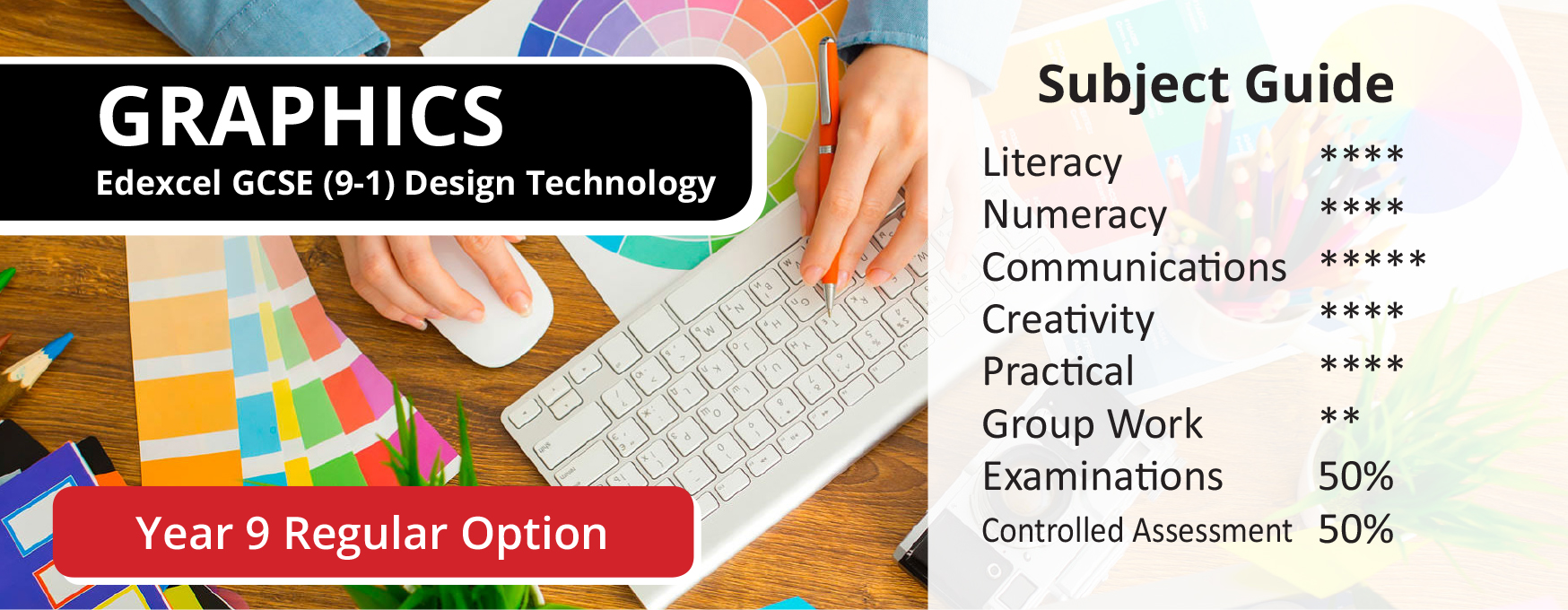
Summary of course
Through a variety of creative and practical activities, pupils learn the knowledge, understanding and skills needed to engage the process of designing and making to complete a Level 1/2 Technical Award in Graphic Design. This graphics course will encourage students to use their imagination to create, design and make prototypes that solve real and relevant problems, considering their own and others’ needs, wants and values. This will be an innovative course that offers students the chance to be creative, enterprising and original. If you are a student looking to build upon your creative design and technical skillset, then this would be the ideal option for you.
Learners will develop the following knowledge, which will inform future training and work in the graphic design industry:
- Graphic design components (line, colour, tone, composition, typography, imagery).
- The use of visual language and graphic design principles.
- Graphic design roles, graphic design work and employment opportunities available in the industry.
- Types of graphic design briefs, the requirements of a brief and the constraints a graphic designer may encounter.
- The stages involved in planning and developing a graphic design and experimentation with tools, materials and techniques.
- Digital technical skills and resources used in graphic design production.
- Displaying, presenting and promoting graphic design work and the considerations to be made.
This qualification aims to focus on the study of the graphic design sector, offering breadth and depth of study, incorporating a key core of knowledge and provide opportunities to acquire a number of practical and technical skills. Career opportunities within this field include working in digital design, print, advertising, marketing, animation, or illustration.
How it’s assessed
Component 1 - Written Exam, 40% of the qualification, 80 marks.
Each examination paper will include a mixture of multiple choice, short and extended response questions. This will assess the learners knowledge and understanding of all content areas, targeting assessment objectives 1-3.
Component 2 - Non-Examined Assessment, 60% of the qualification, 120 marks.
Students will undertake a project whereby they will be assessed on their ability to effectively draw together their knowledge, understanding and skills from the whole vocational area considering all assessment objectives from 1-5.
What it can lead to at College and beyond
Learners who achieve at level 2 might consider progression to level 3 qualifications post-16, such as:
- Level 3 national diploma or extended diploma in art and design practice (graphic design)
- Level 3 art diploma or extended diploma in art and design (graphic design)
- A Level Graphic Design (this will support progression to higher education)
Learners could also progress onto an apprenticeship. The understanding and skills gained through this qualification could be useful to progress onto an apprenticeship through a variety of occupations that are available within the sector; for example, artworker, creative director, advertising art director, animator, illustrator or concept artist.
Extra-curricular commitment requirements
When completing the internally assessed sections of the course students will be required to use the technology facilities to keep up with the demands of the course.
For more information on the course, please contact Mrs Breeze
History
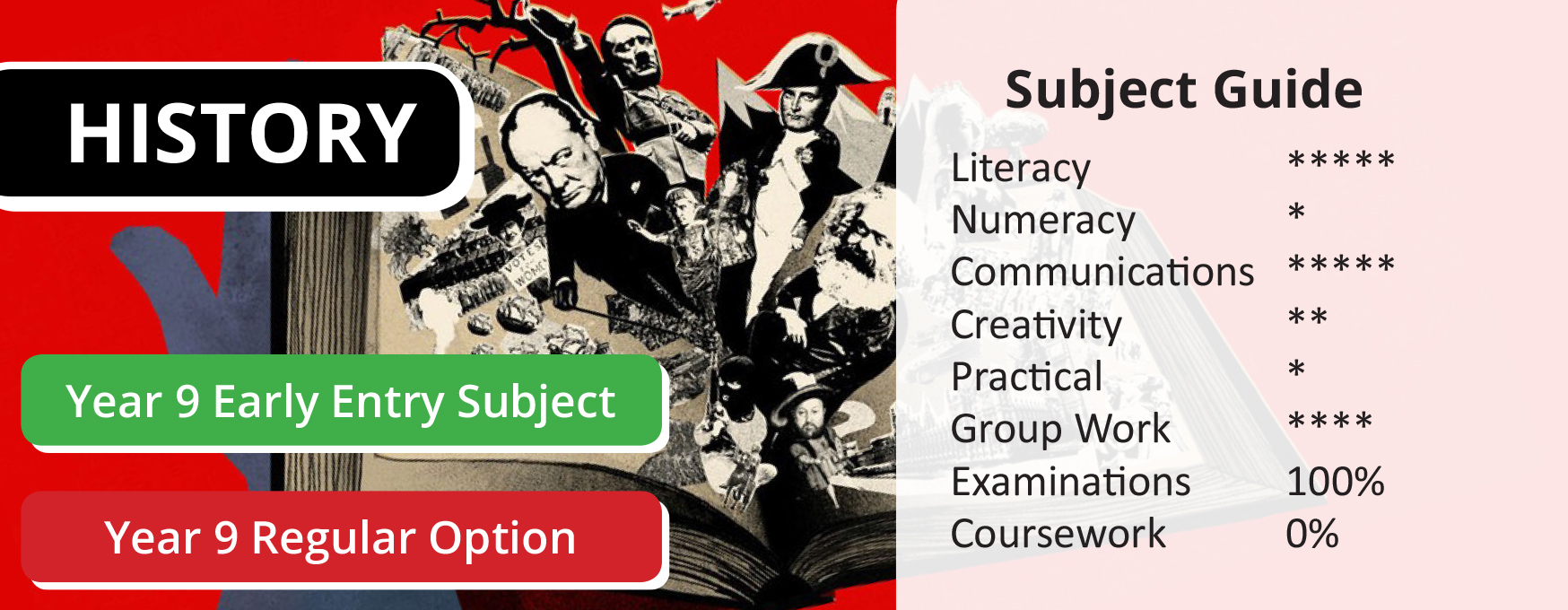
Summary of course
This ever-popular course at GCSE allows students to develop their interest in and enthusiasm for history. Students will study a wide range of periods, key events and people of the past and the ways in which these have shaped our present. History will encourage students to think critically and analytically and create their own balanced, reasoned responses.
- The USA 1929 – 2000
This covers the Depression and how it ended; the struggle for Civil Rights; how music, entertainment and books influenced teenagers to be rebellious; the changing role of women; the part played by different Presidents in changes within America; the Cold War and the search for peace after 1970.
- Germany 1919 – 39
This looks at the impact of the Treaty of Versailles and the problems of the new Weimar Government. This also covers the rise of the Nazis and Hitler’s control over Germany through terror and persuasion. It also looks at the steps to World War Two.
- The Elizabethan Age 1558 – 1603
This unit covers Elizabeth becoming Queen and how she ruled her country; the lifestyles of different groups in terms of their housing, fashion and education; entertainment from bull baiting to theatre; Elizabeth’s Religious Settlement and the numerous Catholic plots to topple her and the attempted invasion by the Spanish Armada.
- Changes in Health and Medicine from c500 to the present day
This examines causes of illness and disease; changes in prevention and treatment; developments in patient care and public health and welfare. This also includes a case study.
What it can lead to at College and beyond
GCSE History is an excellent platform for further study at college and then University. It teaches vital skills. You will learn to absorb information, locate and sift facts, analyse sources and interpretations, weigh up evidence and reach balanced conclusions. You will be able to communicate these ideas verbally and in writing.
These skills are important when you move to college - not just for further study of History but many other subjects too.
It is also highly desirable for employers – if they see History on your CV they will know that you can think critically and analytically, weigh up evidence and reach a decision!
You will find History useful for a career in journalism and media, teaching, law, accounting, marketing, police, armed forces, archaeology, museums and galleries, local government…the list is endless!!!
Extra-curricular commitment requirements
Young historians will research and revise independently in addition to the offered revision sessions and they can also take advantage of other enrichment opportunities such as College trips.
For more information on the course, please contact Mrs McClenaghan
Mathematics
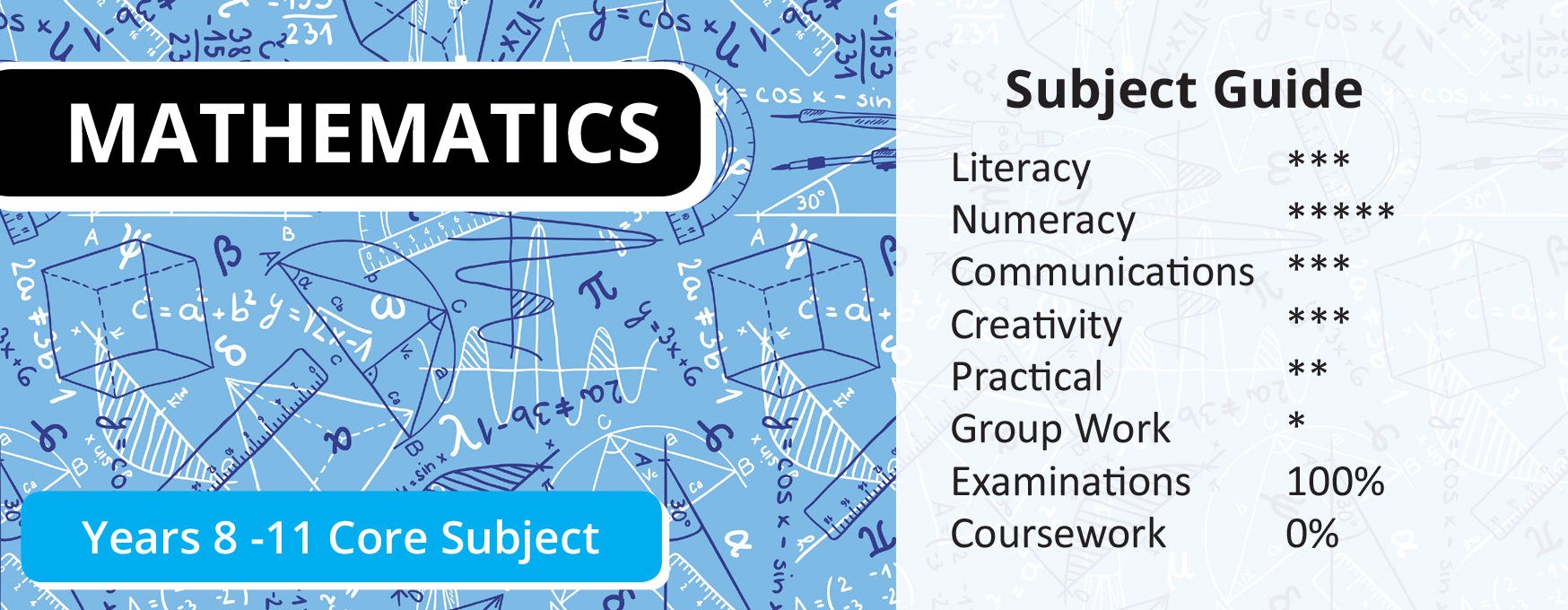
Summary of course (please note mathematics is not an ‘optional’ subject)
Mathematics is offered at two levels of entry; Higher and Foundation. Students wishing to follow Mathematics beyond Key Stage 4 must study Higher. The course covers all aspects of Mathematics and is assessed by a terminal examination made up of three papers. These are 2 x calculator and 1 x non-calculator. In addition to this, all students are assessed each half term to ensure progress is maintained.
At GCSE we build upon the work covered at Key Stage 3 and prepare students to be efficient in the use of mathematics in real-life applications. In the Mathematics faculty, we embrace new technologies but these are underpinned by the traditional approaches to the subject that are required in the wider world. A successful mathematician will be able to show organisation, logic and ordering skills in order to break a problem down to smaller, more manageable tasks.
What it can lead to at College and beyond
Mathematics is required for practically every job that you can imagine. Most job advertisements will request Mathematics at a pass grade at GCSE. The skills developed will demonstrate that problems can be identified and broken down.
As an A level subject it is widely considered to be the most marketable, opening doors into careers in ICT, law, engineering, medicine, science and business. The skills that you will develop are universal and can be implemented in many areas.
Extra-curricular commitment requirements
Students will be expected to complete a weekly homework of up to 1 hour in length. In addition, students will be asked to practice basic skills using the ICT available.
For more information on the course, please contact Mr Patel
Modern foreign languages - french
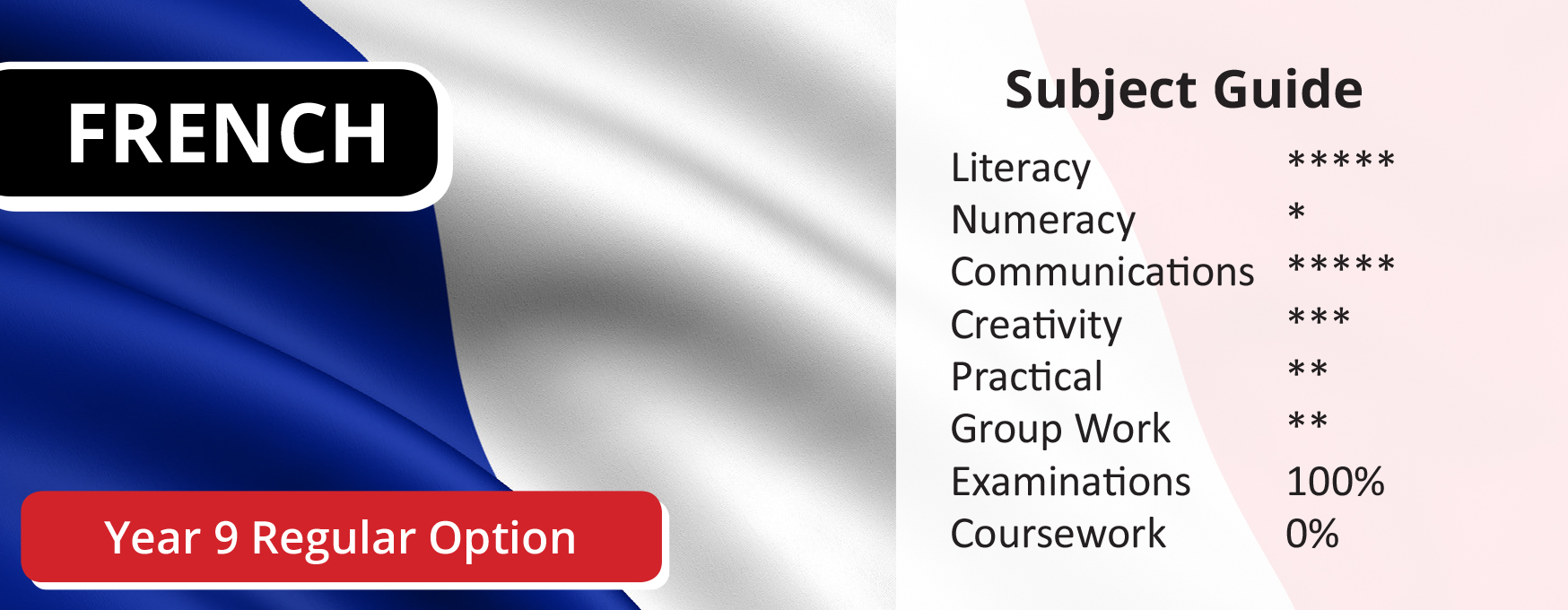
Summary of course
Students will study a range of topics, including holidays, health and lifestyle, education and future career paths and personal relationships.
- Listening, speaking, reading and writing all count for 25% towards final grade and are assessed by final exam.
- Writing will take the form of short and longer written responses to stimuli at either Foundation or Higher Level and a translation task.
- Speaking interactions will include a roleplay task, a read aloud task and a photo-based discussion with a conversation on various topics.
- Reading will include a translation element from Spanish into English.
What it can lead to at College and beyond
French can be studied as an A-Level at college or taken as a supplementary unit for courses such as cabin crew and leisure and tourism. Some universities (Edinburgh and UCL) and courses, like Law, require a language GCSE. If applicants do not have this qualification, then they may be required to work independently in their first year to achieve one.
Speaking different languages can open up a wealth of opportunities, from increasing our cultural awareness to making us more employable. In a CBI survey 72% of businesses valued language skills amongst their employees.
Extra-curricular commitment requirements
Students will be expected to do writing, reading, vocabulary and speaking learning tasks once a week.
GCSE support sessions will be around once a week or by arrangement with the teacher. There will be revision sessions for all skills in Year 11.
For more information on the course, please contact Mr Valera
You have not allowed cookies and this content may contain cookies.
If you would like to view this content please
Modern foreign languages - spanish
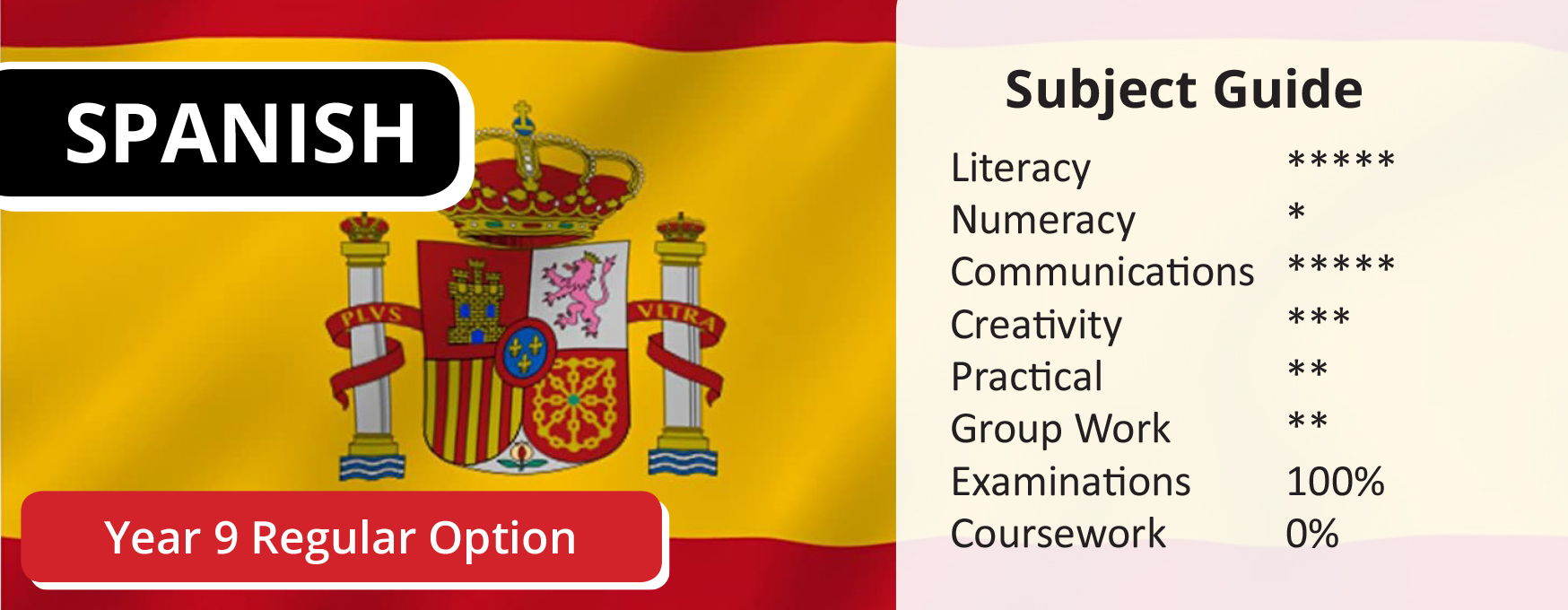
Summary of course
Students will study a range of topics, including holidays, health and lifestyle, education and future career paths and personal relationships.
- Listening, speaking, reading and writing all count for 25% towards final grade and are assessed by final exam.
- Writing will take the form of short and longer written responses to stimuli at either Foundation or Higher Level and a translation task.
- Speaking interactions will include a roleplay task, a read aloud task and a photo-based discussion with a conversation on various topics.
- Reading will include a translation element from Spanish into English.
What it can lead to at college and beyond
Spanish can be studied as an A-Level at college or taken as a supplementary unit for courses such as cabin crew and leisure and tourism. Some universities (Edinburgh and UCL) and courses, like Law, require a language GCSE. If applicants do not have this qualification, then they may be required to work independently in their first year to achieve one.
Speaking different languages can open up a wealth of opportunities, from increasing our cultural awareness to making us more employable. In a CBI survey 72% of businesses valued language skills amongst their employees.
Extra-curricular commitment requirements
Students will be expected to do writing, reading, vocabulary and speaking learning tasks once a week.
GCSE support sessions will be around once a week or by arrangement with the teacher. There will be revision sessions for all skills in Year 11.
For more information on the course, please contact Mr Valera
You have not allowed cookies and this content may contain cookies.
If you would like to view this content please
music
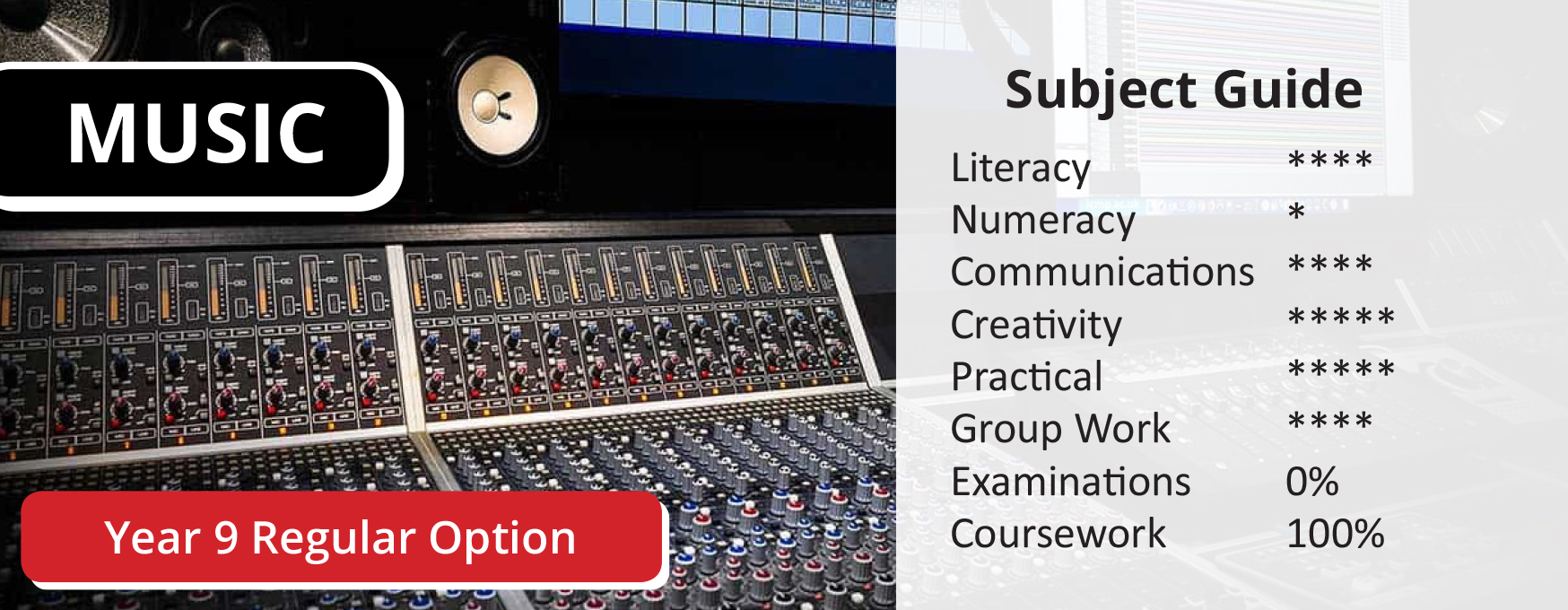
Summary of Course
The BTEC Tech Award in Music Practice is for learners interested in taking a hands-on course alongside their GCSEs that will offer them an insight into what it is like to work in the Music sector – a vibrant, exciting and competitive industry that offers many different and exciting new work opportunities, whether in composing, performing, or producing music. This course allows learners to explore the sector, and to learn and try out new skills, techniques and styles, allowing them to make an informed decision about their future learning and career.
The course gives learners an opportunity to explore music in a practical setting and to develop understanding of the techniques used to create and realise music. They will explore a variety of musical styles and the musical theory and techniques that underpin them and develop technical and practical skills through workshops and classes. In addition, learners will develop transferable and employability skills such as responding to a brief, self-development, planning, time management and communication.
This is a very hands-on and practical course, however the practical element for each of the components detailed below is accompanied with written coursework assignments. There is no written exam for this course.
Components
Component 1: Exploring Music Products and Styles
Learners will explore the techniques used in the creation of different musical products and investigate the key theory and musical features of different musical styles, such as live performance, original song writing, DAW project, multi-track recording & World Music.
Component 2: Music Skills Development
Learners will have the opportunity to develop two out of three musical disciplines (music performance, creating original music & music production) through engagement in practical tasks, while completing written assignments that document their progress and planning for further improvement.
Component 3: Responding to a Music Brief
Learners will be given the opportunity to develop and present music in response to a given music brief. The final assessment will be selected from the following: perform stylistically accurate cover versions; creating original music that is stylistically accurate or stylistic use of a DAW (Logic Pro) to create an original piece of music.
What it can lead to at College and beyond
The course has been fully accredited and is recognised by colleges. There are many different music options available at local colleges and this comprehensive course lends itself well to the transition on to these courses. This vocational music course will be very beneficial to anyone interested in working in the music industry (as performers, composers, technicians, journalists, etc.), education and beyond.
If you don’t choose to study music at College, then it is a great addition to your CV; demonstrating commitment, creativity, confidence, aural skills, team work and analytical writing.
Extra-curricular commitments & requirements
Students are expected to be able to play an instrument or sing to a sufficient standard to opt for Music. You will be required to demonstrate this skill and relevant evidence for the performing, composing and understanding musical elements required to study this course. From the start of the course, all students are required to commit to regular lessons for either their voice or instrument. These lessons can be provided with an extra discount at our Saturday Music School, unless you already have private lessons outside of school (evidence of this will be required).
For more information on the course, please contact Mr Armstrong
physical education
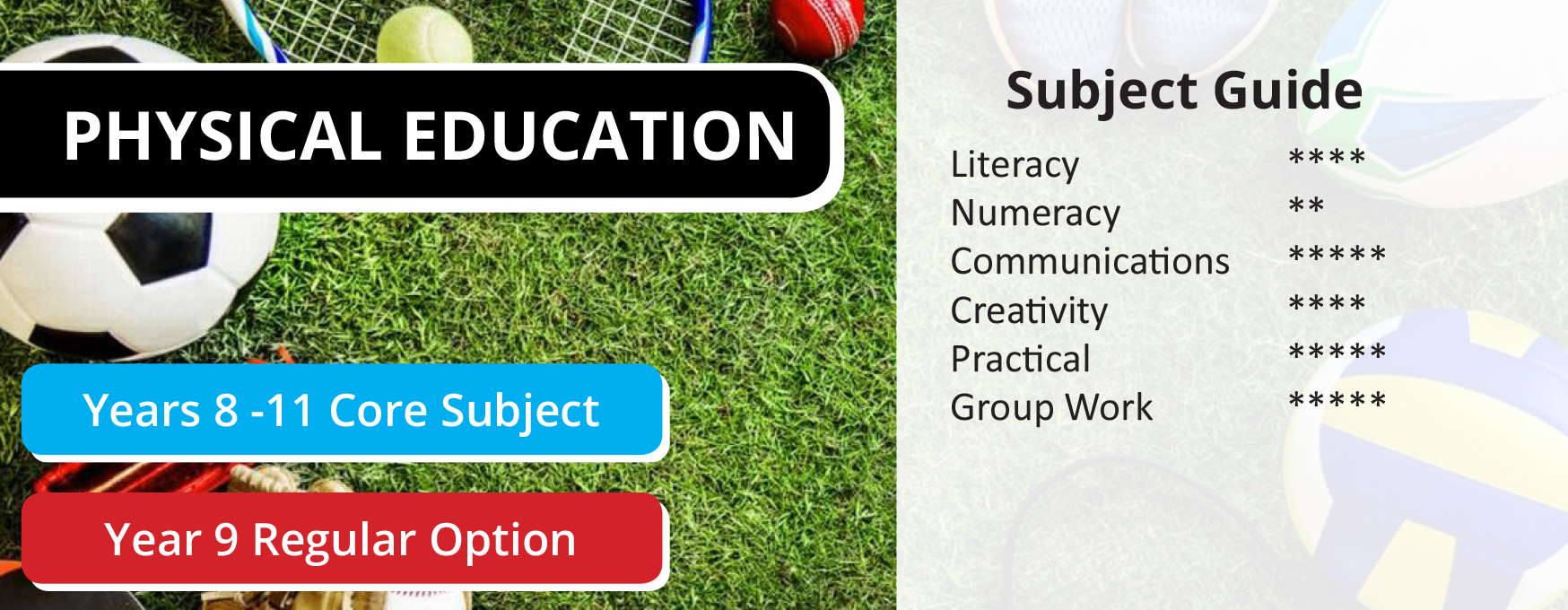
Summary of courses
GCSE Physical Education offers 2 different courses depending on your learning needs/ strengths.
GCSE PE
This GCSE in Physical Education equips students with the knowledge, understanding and skills to develop their own performance in sport. They develop their understanding of socio-cultural influences on participation in sport, and the benefits of physical activity to health, fitness and well-being.
60% examined
10 % Coursework
30% practical assessment
*This qualification suits learners who will perform to a high level across 3 different sports.
VCERT Health and fitness
Our Level 1/2 Technical Award in Health and Fitness provides core knowledge to pupils who are passionate about fitness and performance – from the structure and function of body systems and the effects of health and fitness activities on the body, through to the principles of training and how to structure a health and fitness programme.
60% Non-examined assessment (coursework)
40% Examined assessment
Lots of practical work but no sporting assessments
*This qualification suits learners who have a real passion for health and fitness.
What it can lead to at College and beyond
- A-Level PE or T-Level courses at college
- Careers as: Athletes, Physiotherapists, Sports therapists, Sports Scientists, PE Teachers, Sports coaches, Sports analysts, Sports management, Sports journalists, Nutritionist/Dietician and various other public services.
Extra-curricular commitment requirements and expectations
We encourage all of our students, especially those who have opted for a qualification within the P.E department, to continue to participate in their chosen sport in a club outside of lessons. We would also encourage our GCSE PE students to assist with coaching younger students during extra-curricular clubs and matches.
Students are expected to compete in at least one sport competitively outside of school. Students are expected to regularly attend a variety of extracurricular clubs and represent school teams across different sports to support their practical assessment.
For more information on the course, please contact Mr Chaplin
religious studies
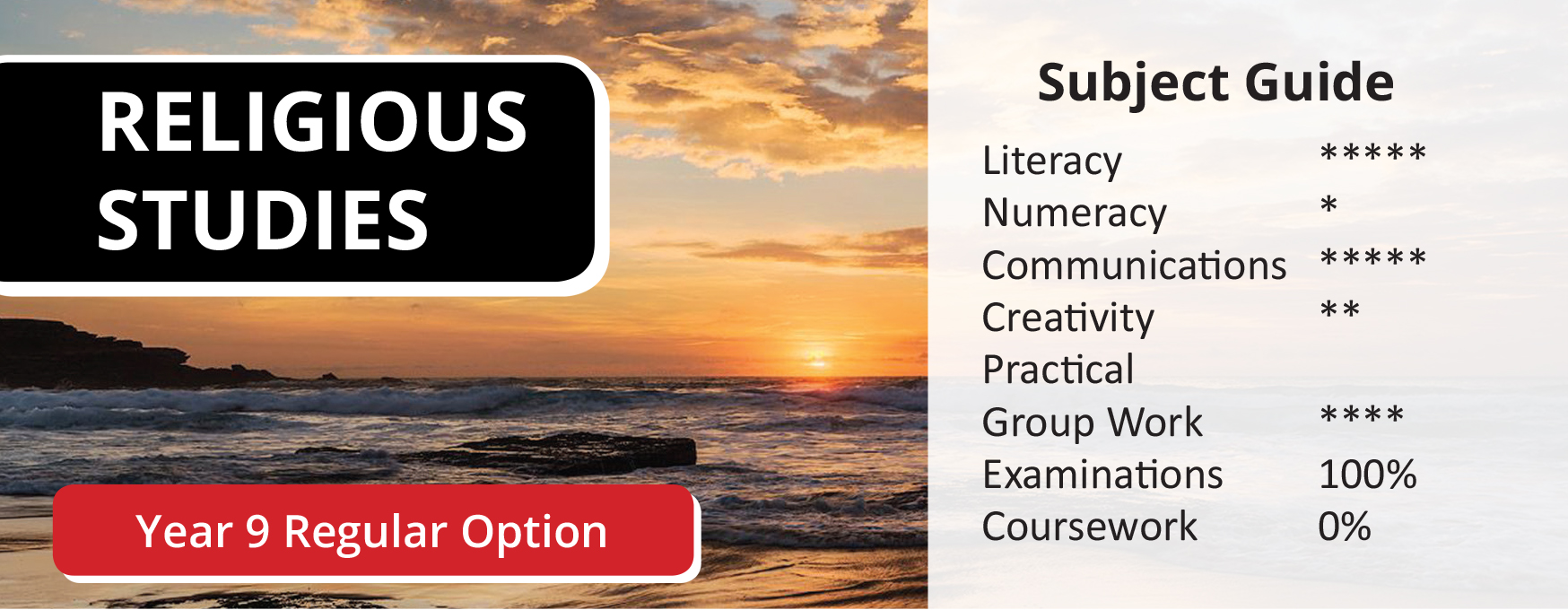
Summary of course
RS GCSE offers students the chance to engage with and make sense of the fast-changing world, by investigating and debating relevant moral issues, such as euthanasia, relationships, human rights, social justice, the environment, crime, and the use of the death penalty.
We use case studies to help the students to develop their own ideas around the issues covered as well as looking at the different views within Christianity and Islam. The GCSE will allow students to be able to develop their skills of debating and being able to argue their points constructively and being able to appreciate the views of others respectfully, even if they do not agree with them.
We are currently developing a range of enrichment opportunities to visit places of worship and engage with religious believers on how their faith works in the today’s world. Alongside this we will offer opportunities to discuss some of the issues we cover with professionals that work in those areas, such as medicine and the criminal justice system.
There are two exams:
- Paper 1 covers the religious beliefs and practices of Christianity and Islam.
- Paper 2 covers the themes of Religion and Life, Crime and Punishment, Human Rights + Social Justice and Relationships and family. Both papers are 1hr 45mins.
What it can lead to at College and beyond
Religious Education is useful for further study at College and University, due to the skills it develops, such as evaluation and debate. Many employers value R.S. because it promotes understanding of people and cultures, which are important in any workplace. R.S. is advantageous for people considering a career in any caring profession or the public sector, such as the police, military, teaching, journalism, medicine, customer service, hospitality, social services or sales and advertising.
Extra-curricular commitment requirements
Students are expected to keep up-to-date with current affairs through newspapers, television, the internet and radio, as well as attending revision sessions and going on course related trips.
For more information on the course, please contact Mrs Jones
science (combined)
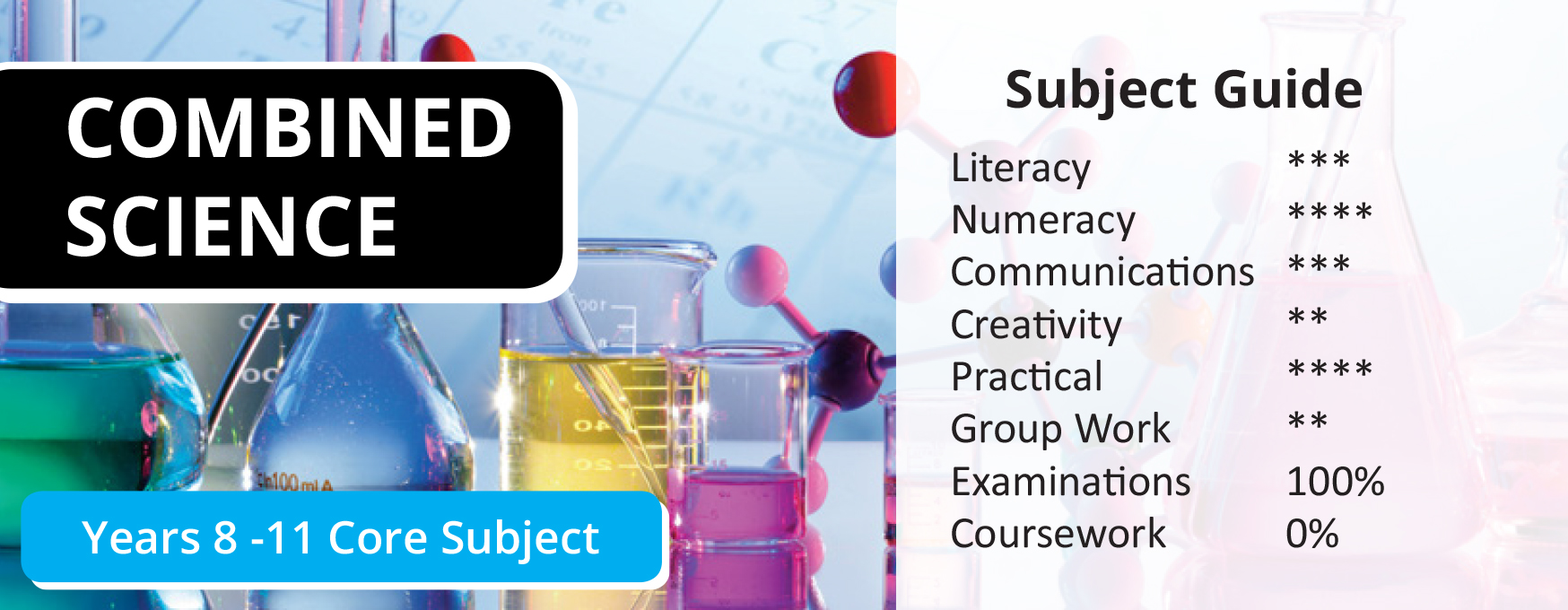
Summary of course (please note science is not an ‘optional’ subject)
This is a double award GCSE which means it is equivalent to two GCSEs. Students studying this course will be taught the three disciplines of Biology, Chemistry and Physics in the traditional fashion.
Assessment is terminal (at the end of Year 11) and consists of six exams in total (two for Biology, two for Chemistry and two for Physics). All the papers are 1 hour and 15 minutes in duration and are available in foundation and higher tiers. The papers are equally weighted at 16.7% each and are made up from multiple-choice, structured closed and short answer as well as open answer questions.
‘Required Practicals’ are part of the science GCSEs and in combined science there are 21. These are practical tasks that the students will need to complete during the course to help develop investigation skills and they will be assessed as part of the terminal exams.
What it can lead to at College and beyond
Students following the combined science course can expect to follow ‘pure’ science A-Levels like Biology, Chemistry and Physics.
Careers including healthcare, engineering, forensic science, veterinary science and medicine, which are all areas that science is relevant to. There are also many other jobs that use science in different forms.
Extra-curricular commitment requirements
You will be expected to undertake independent review and revision of the topics studied throughout the course. There will be regular end of topic tests as well as mock tests throughout the course to prepare you for the demands of the terminal exams. Revision sessions will be compulsory in the run-up to the exams. Intervention support will be given to students not achieving their full potential.
For more information on the course, please contact Mr Russell
science (triple)
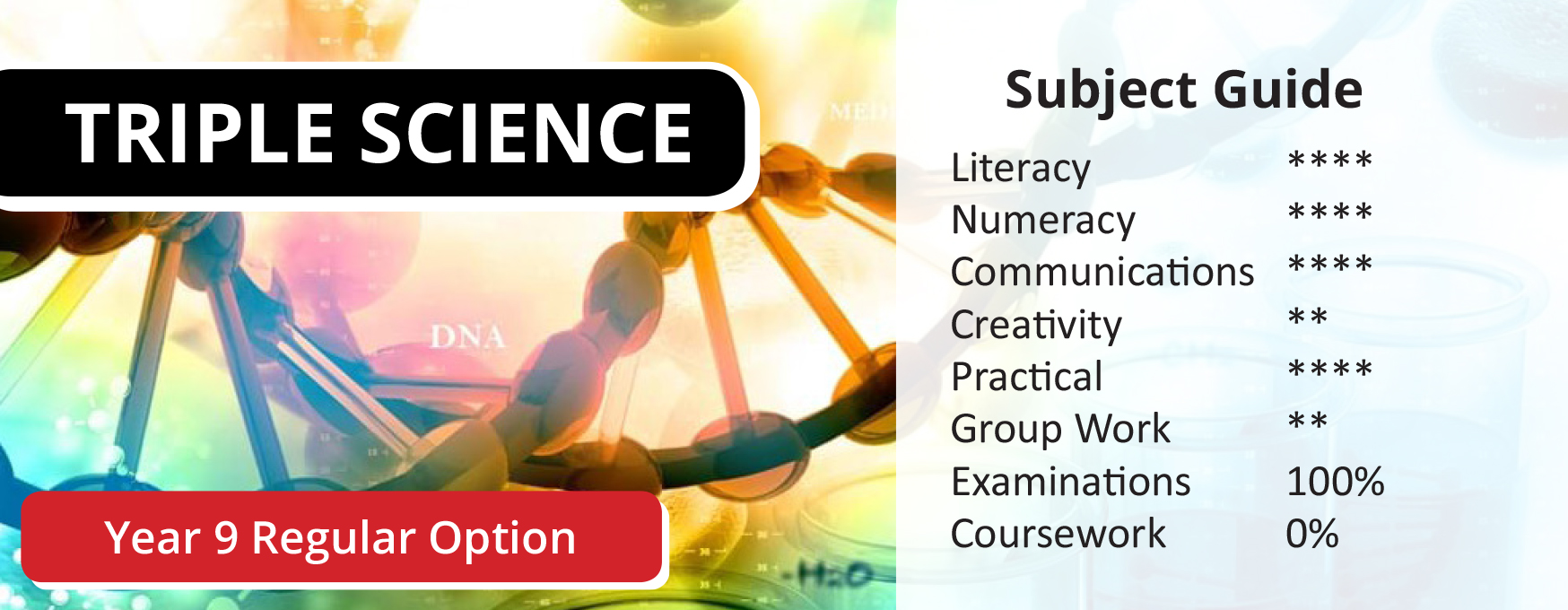
Summary of course
Students following the Triple Science course will achieve 3 GCSEs in the Science disciplines of Biology, Chemistry and Physics. Triple science covers more content than combined science and provides a very comprehensive foundation to those students who intend to follow the pure sciences at A-Level.
Assessment is terminal (at the end of Year 11) and will consist of 6 exams in total. There are two exams in each subject area. Each exam has a 50% weighting for the GCSE and the duration of the exam is 1 hour and 45 minutes. For example: combined science, there are ‘required practicals’ that the students will undertake throughout the course to develop scientific investigation skills as well as reinforce understanding. There are 28 practicals in total and these will be assessed as part of the terminal examination.
What it can lead to at College and beyond
Students following the separate science route can expect to follow ‘pure’ science A-Levels such as Biology, Human Biology, Chemistry and Physics.
Potential future careers may include opportunities to work in engineering, forensic science, veterinary science and medicine.
The skills developed through this course of investigation, research, presentation of findings and evaluation are widely valued by higher education and employers.
Extra-curricular commitment requirements
This is a demanding course and students will be expected to undertake independent review and revision of the topics studied throughout the course. There will be regular end of topic tests as well as mock tests throughout the course to prepare students for the demands of the terminal exams. Revision sessions will be compulsory in the run-up to the exams. Intervention support will be given to students not achieving their full potential.
For more information on the course, please contact Mr Russell
sociology
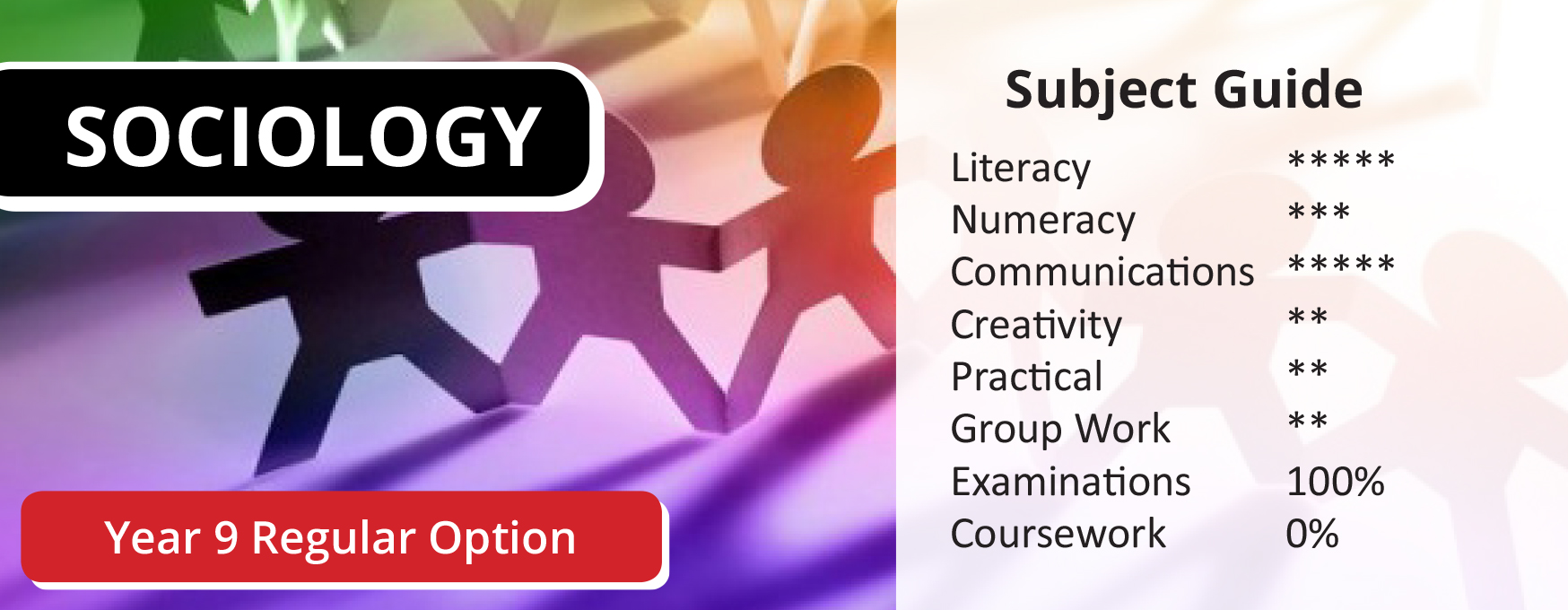
Summary of course
Sociology is the study of societies, how they work and change. You will learn about how societies shape peoples’ ideas and behaviour and how in turn people shape their societies.
You will study two main components which cover the following topic areas:
Component 1: Understanding social processes
- Key concepts and processes of cultural transmission
- Families
- Education
- Sociological research methods
Component 2: Understanding social structures
- Social differentiation and stratification
- Crime and deviance
- Applied methods of sociological enquiry
Along with these topics, students will be studying a range of different theories including: Functionalism, Marxism and Feminism. They will have to relate their knowledge of these topics to the different theories to argue and evaluate different perspectives.
There will be the opportunity for a residential trip to London where students will visit the V&A Museum, tour the Old Bailey and the Criminal Justice Courts to build on topics studied in class.
At the end of the course there are two written exams, each worth 50% of the overall grade, with a mix of short answer, structured questions and extended response questions. There is one for each component studied.
What it can lead to at College and beyond
It is a discipline accepted by universities and employers alike. It would be an excellent subject to choose if you are considering college courses in sociology, media, criminology, psychology or law. Students of sociology go on to a hugely diverse range of careers, from jobs in the media, such as researchers and journalists, to teaching and lecturing, to police work, to social work and health care; the list is endless!
Extra-curricular commitment requirements
As a new subject that you won’t have studied before you need to complete regular homework outside of college and attend revision classes as necessary to support with your revision.
For more information on the course, please contact Mr McGinley
